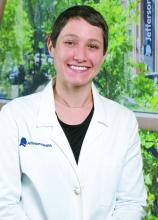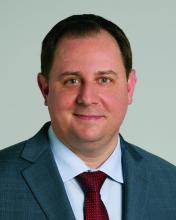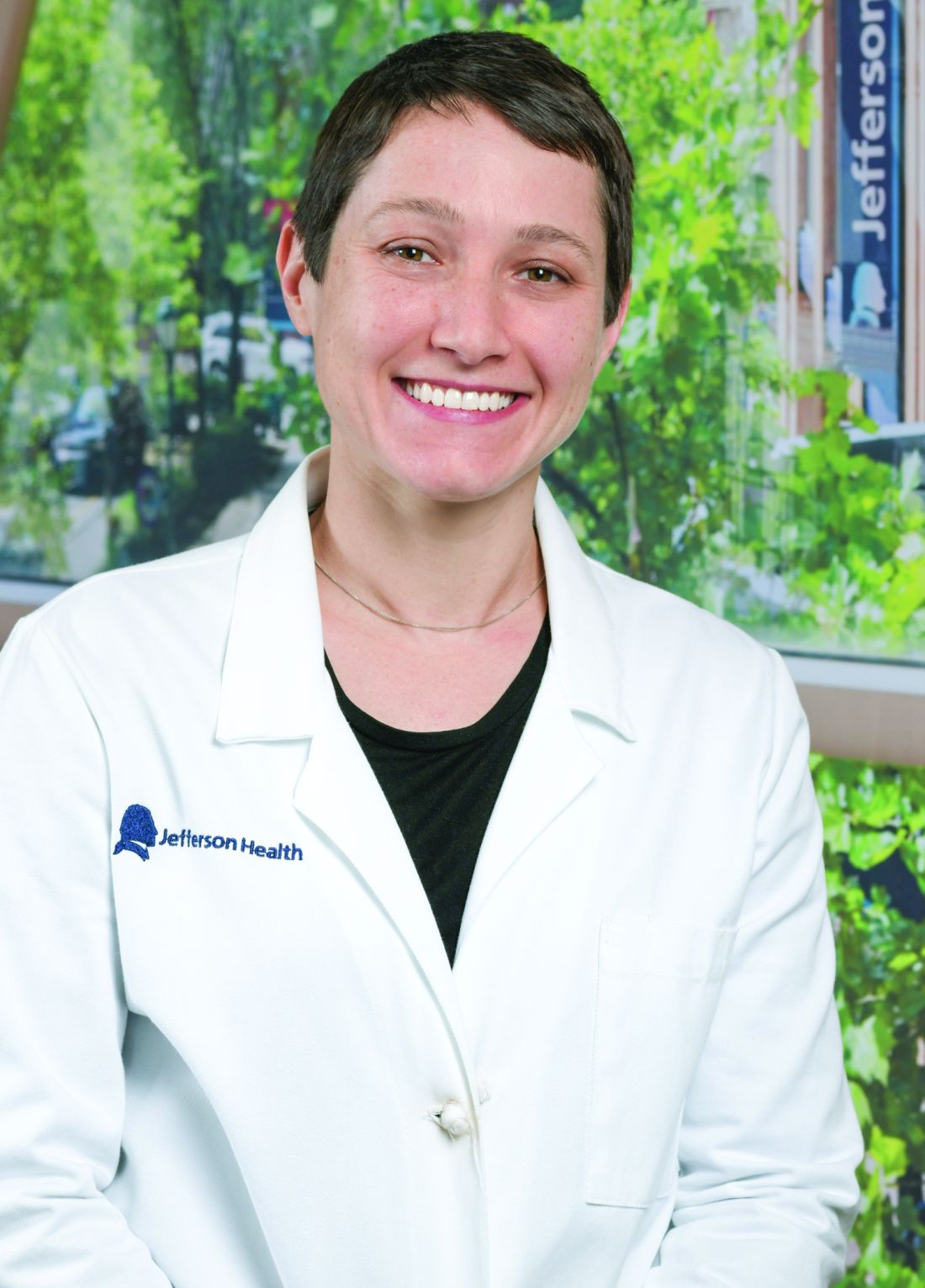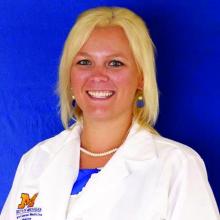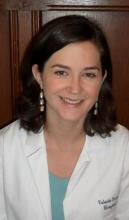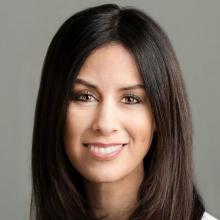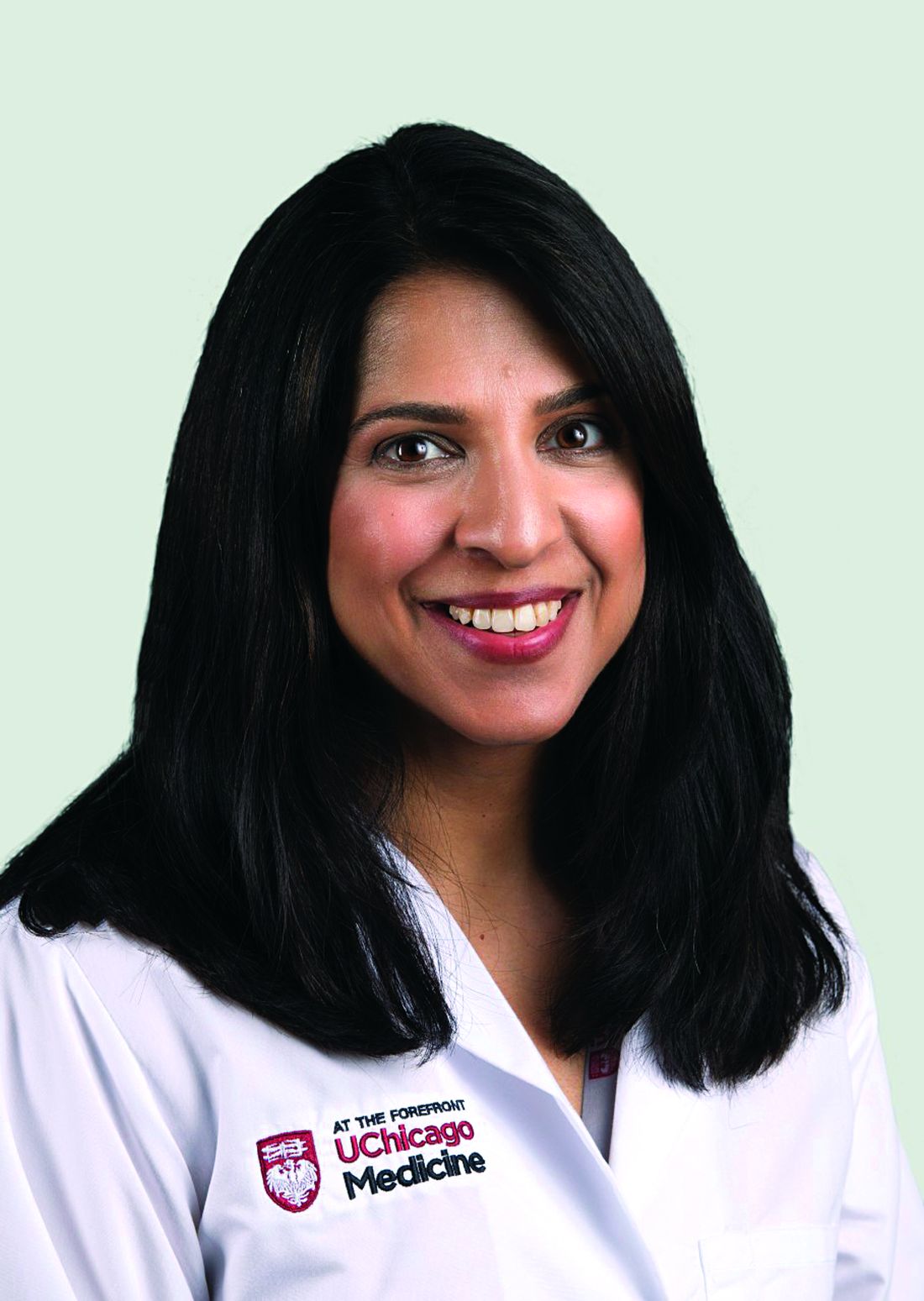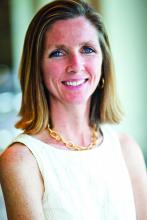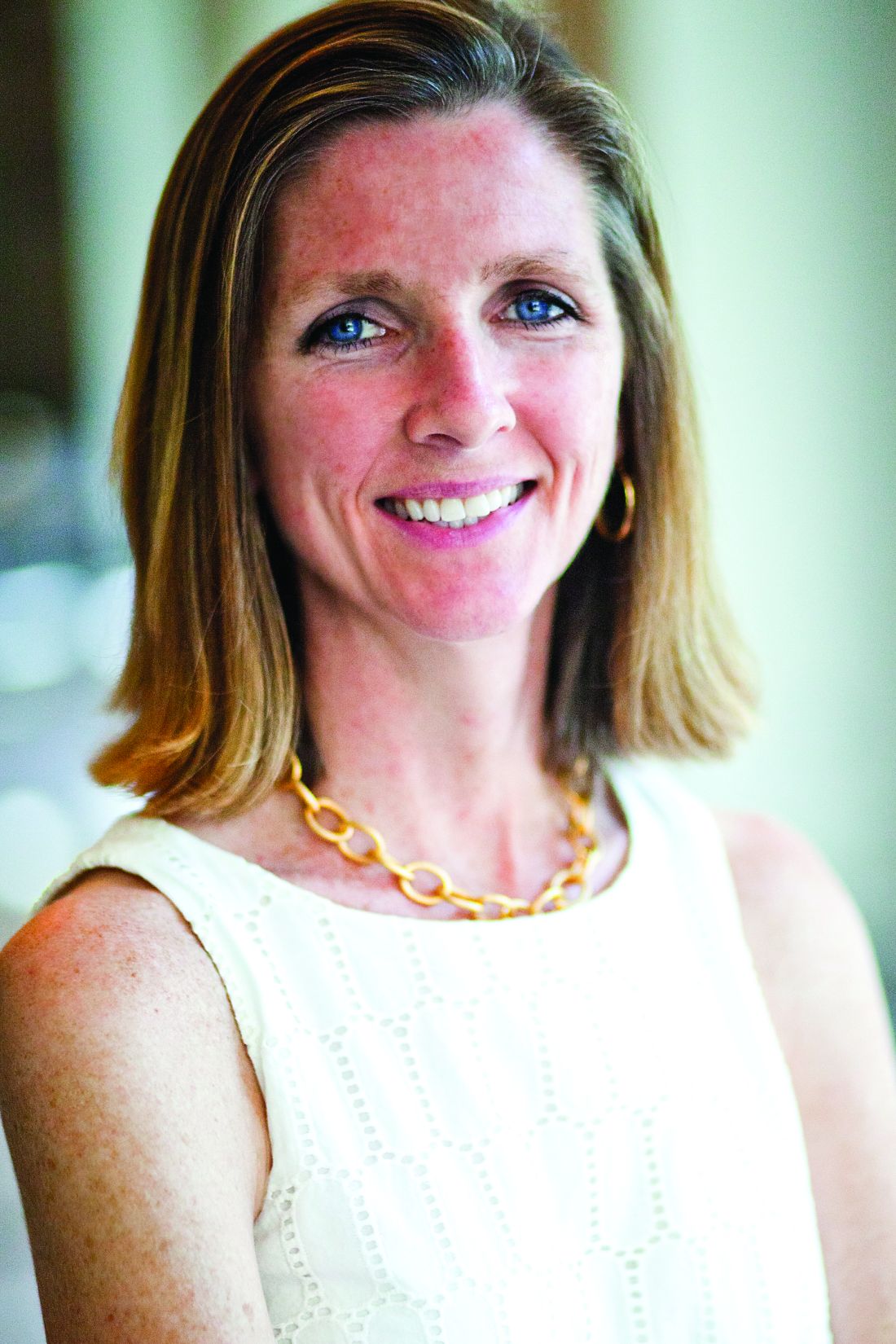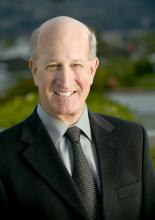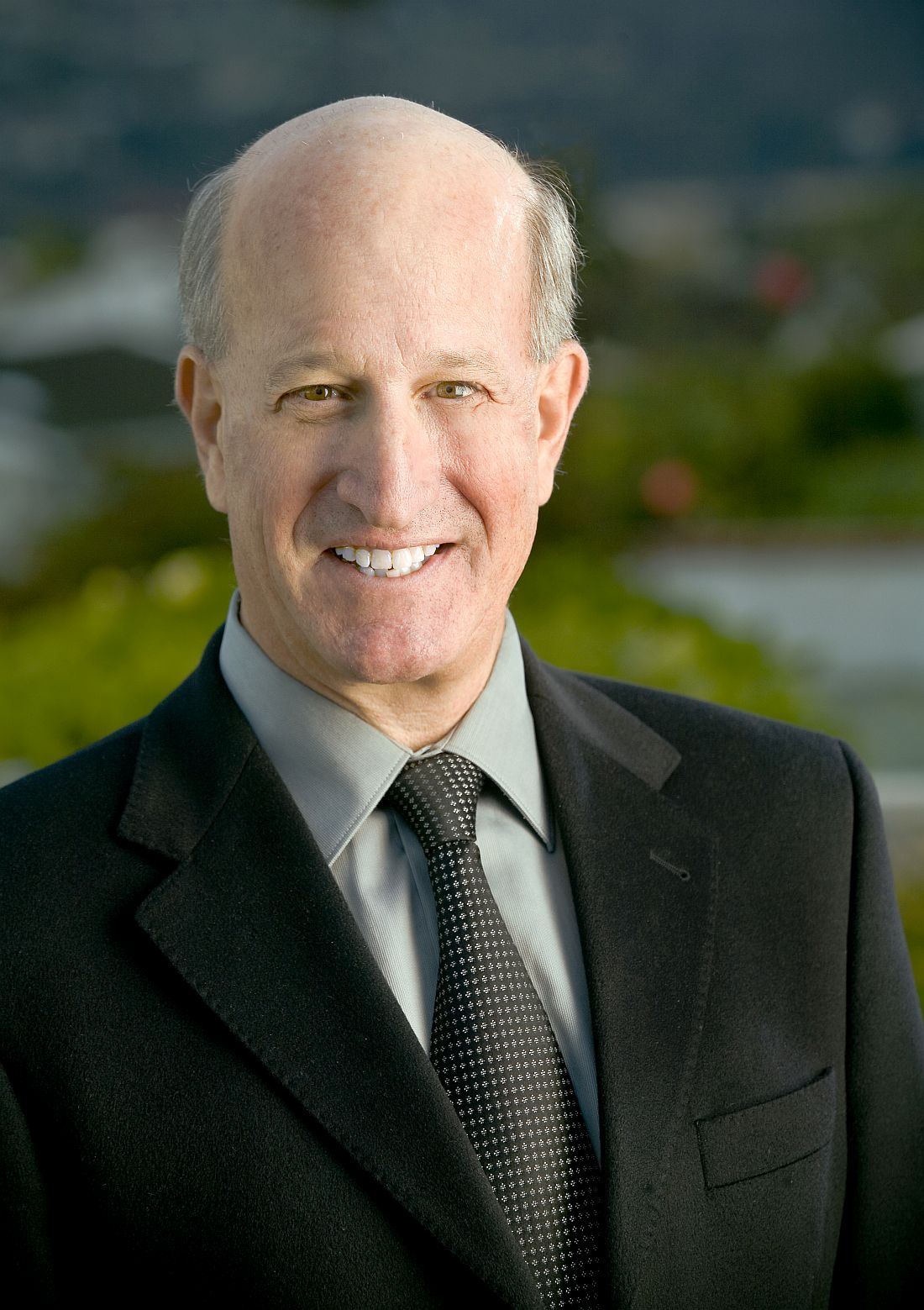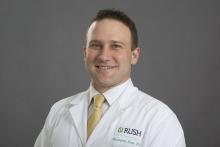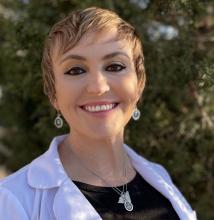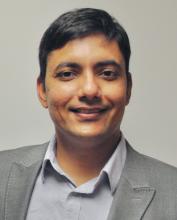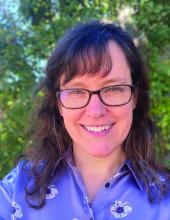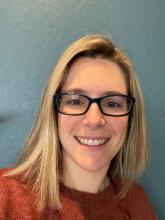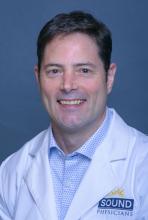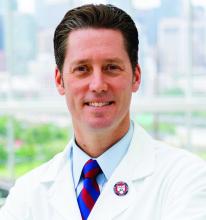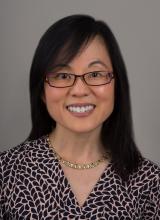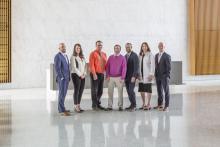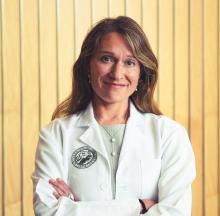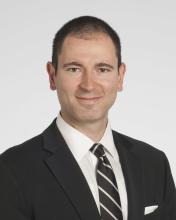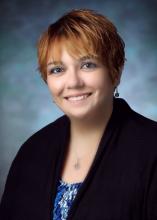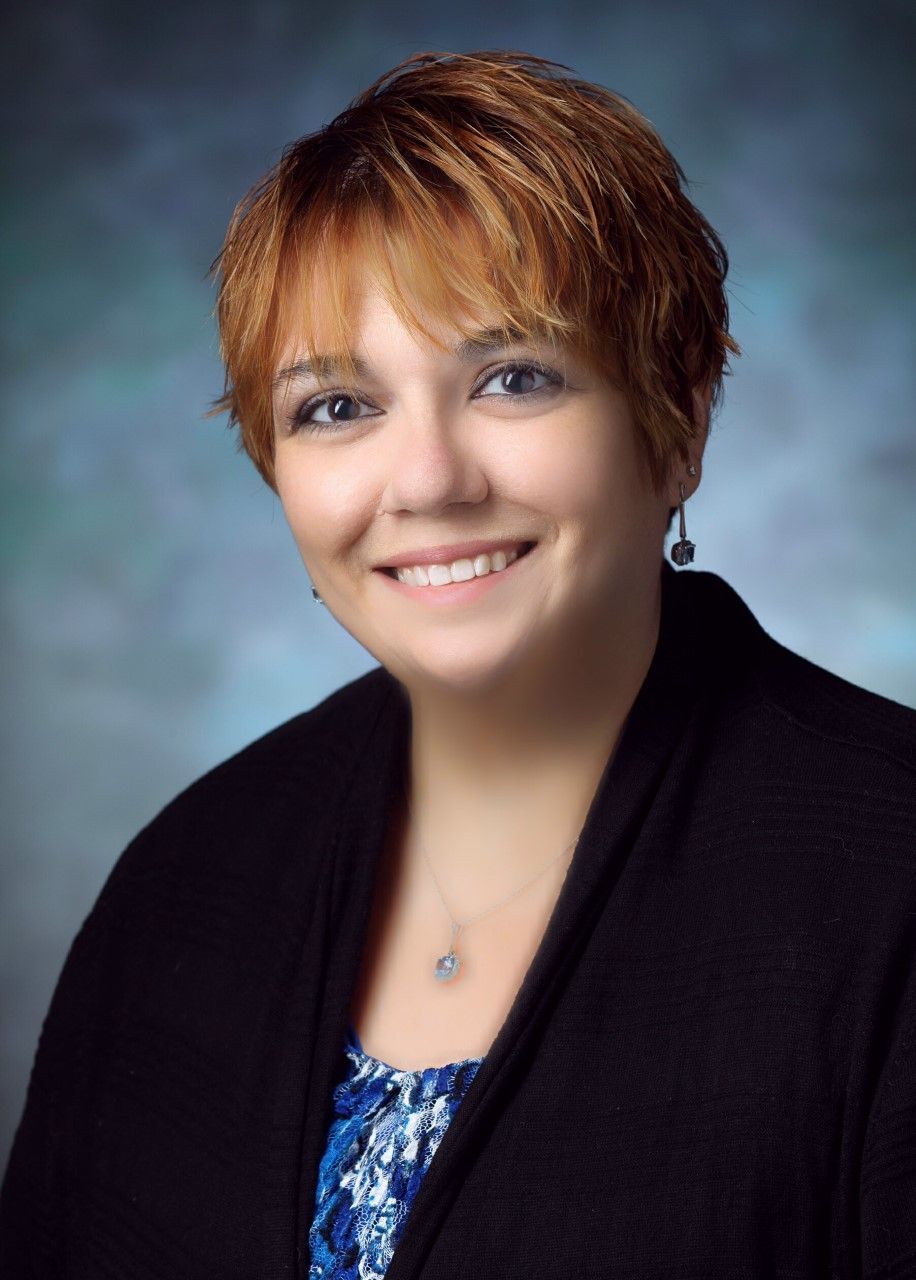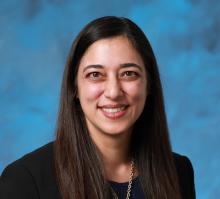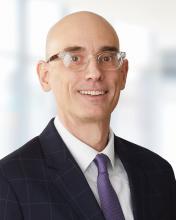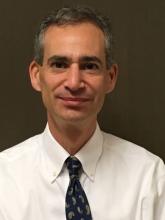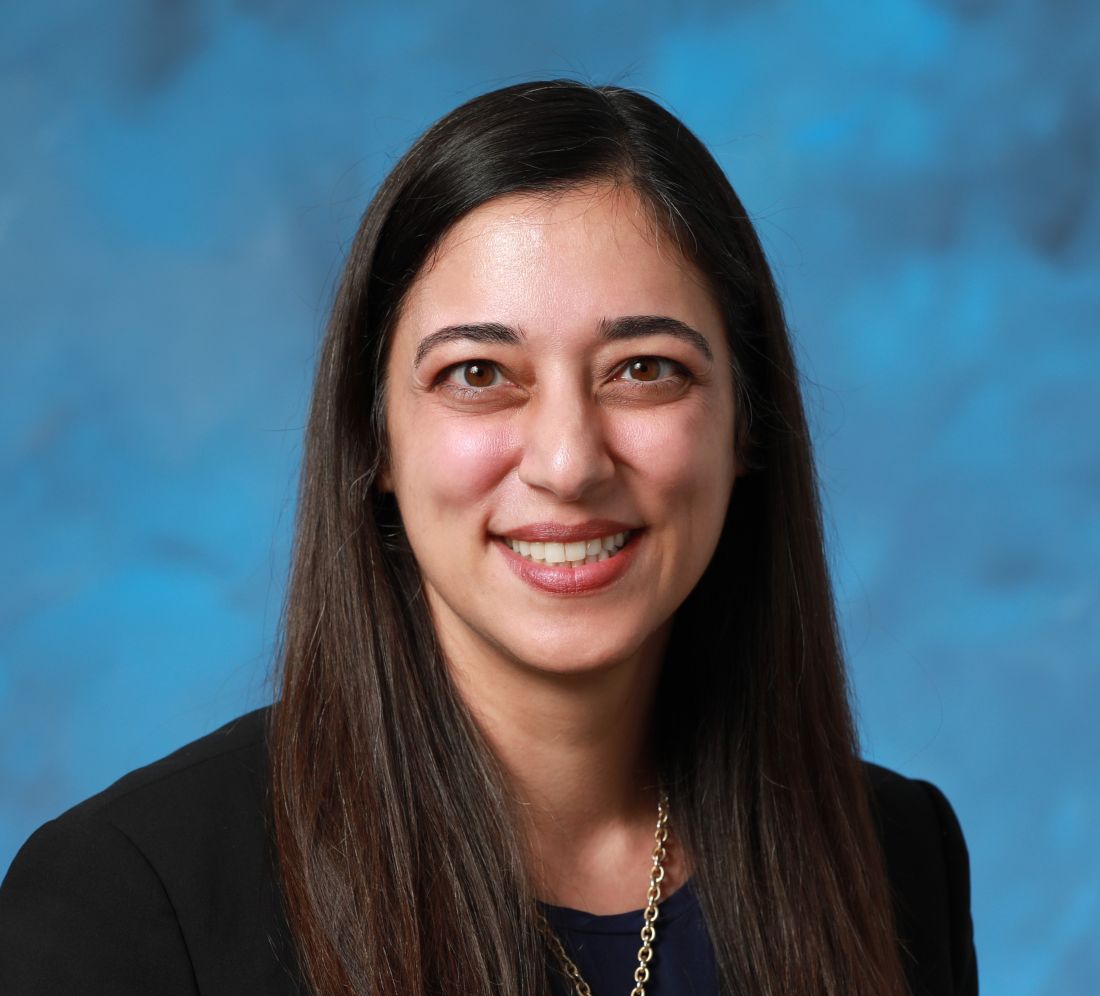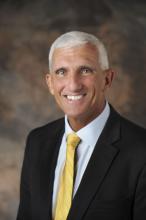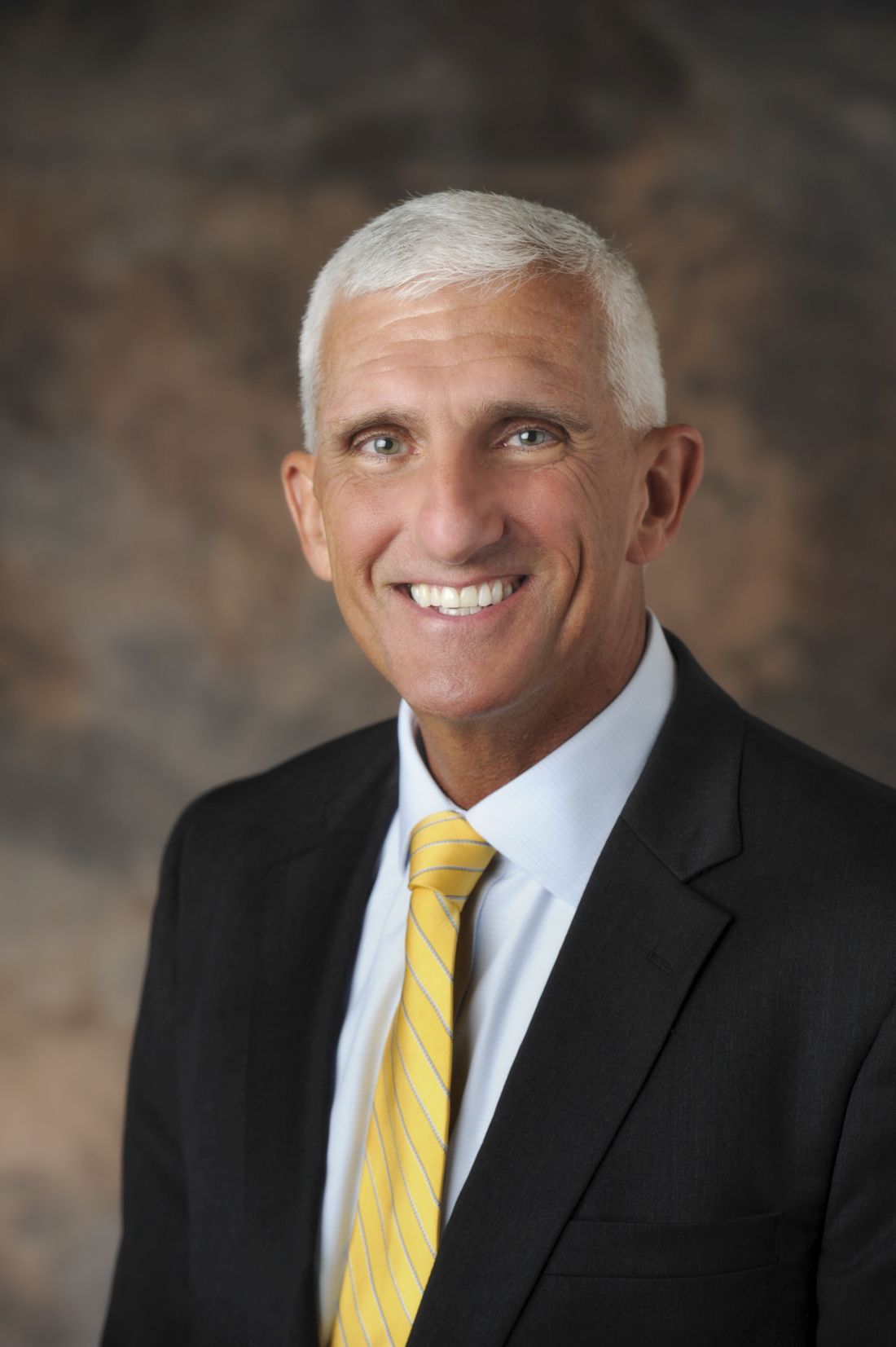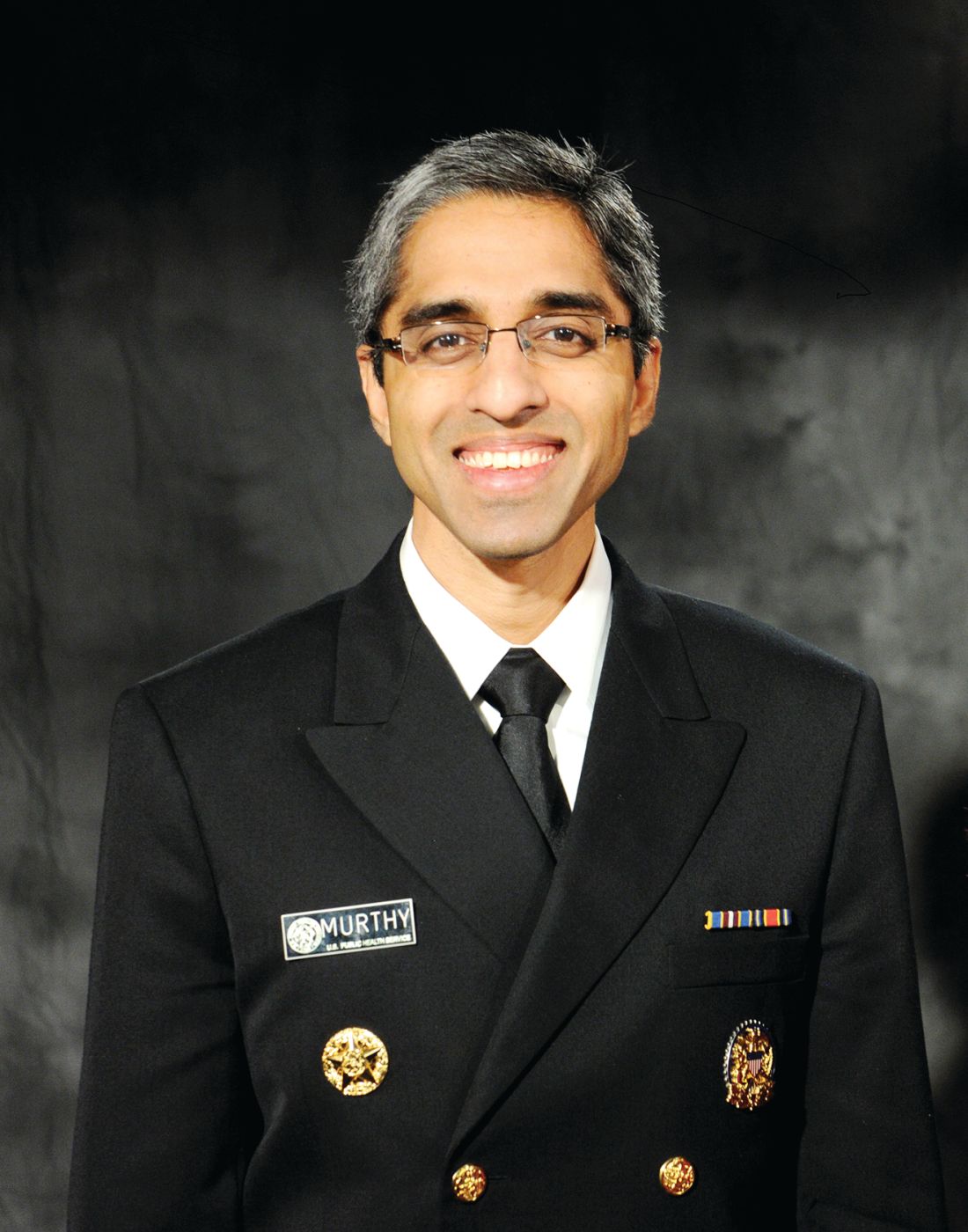User login
Hospitalist movers and shakers – May 2021
Rebecca Jaffe, MD, has been elevated to the permanent role of director of the division of hospital medicine at Thomas Jefferson University Hospital in Philadelphia. Dr. Jaffe has been the interim director since July 2020.
In the position, Dr. Jaffe will be responsible for leading an academic hospital medicine division that includes 36 faculty and 10 advanced-practice providers. She said her focus will be on developing physicians, advanced providers, and the inpatient practice model used while “educating the next generation of creative and compassionate clinicians.”
Dr. Jaffe is associate professor of medicine at Jefferson’s Sidney Kimmel Medical College and the hospital’s director of clinical learning environment improvement.
Christopher Freer, DO, recently was named the new senior vice president for emergency hospital medicine for RWJBarnabas Health (West Orange, N.J.). In a concurrent move, Maninder “Dolly” Abraham, MD, was named RWJBH’s chief of hospital medicine. The selections were made as RWJBH has become a direct employer for Envision Physician Services, a former hospital partner.
Dr. Freer has spent the past 5 years with RWJBH, where he has served as emergency services system director since 2015. He previously worked in leadership roles at Saint Barnabas Medical Center.
Dr. Abraham was previously medical director of Saint Barnabas’ hospitalist program, as well as a regional medical director with Envision during her 17 years of experience.
Sheetal Patel, MD, has been named the new regional medical director for Eagle Telemedicine (Cincinnati, Ohio), a physician-led company that provides telehospitalist services to hospitals around the country.
Dr. Patel will work closely with hospital administrators and medical directors to provide high-level telemedicine services, as well as devising processes and guidelines to guarantee streamlined care across Eagle’s facilities.
Dr. Patel has spent 4 years as a telehospitalist for Eagle, where she has been in charge of guiding on-site and remote staff members and providing training to new telehospitalists.
Timothy Crone, MD, MBA, has been elevated to the role of president of Cleveland Clinic Mercy Hospital (Canton, Ohio). The move comes as Cleveland Clinic recently added Mercy Medical Center as a full member of its health system.
Dr. Crone has served as chief medical officer at Cleveland Clinic Hillcrest Hospital in Cleveland since 2019. Previously, he was a medical director in enterprise business intelligence and analytics in medical operations at Cleveland Clinic’s main campus. He also was vice chairman of hospital medicine and has served as a staff hospitalist since 2010.
In addition to his role as president, Dr. Crone plans to work in patient care at Mercy Hospital.
Just prior to the start of 2021, Wake Forest Baptist Health (Winston-Salem, N.C.) established a “Hospitalist at Home” program with the goal of reducing the length of time patients spend in the hospital.
Hospitalist at Home was created as the COVID-19 pandemic threatened hospital capacity. Wakehealth’s innovative approach involves developing an at-home plan with each patient before they leave the facility. Patients include those with COVID-19 who are stable but require supplemental oxygen or have diseases that need intravenous medication administration.
At home, a Wakehealth paramedic visits the patient while a hospitalist communicates and reviews the patient’s care plan via smartphone, tablet, or computer. The visits continue until the patient’s hospital-related care is complete.
The Multicare Health System (Tacoma, Wash.) has bulked up its hospitalist program by partnering with nationwide, physician-led health care provider Sound Physicians. The goal is to provide health care management at a regional level instead of individually per hospital.
Sound Physicians, which already contracts to provide hospitalist services at two Multicare facilities in Washington, transitioned its services to three other facilities as of April 5, 2021.
Conemaugh Meyersdale Medical Center (Meyersdale, Pa.) has started a hospitalist program at its facility in Somerset County. The program will be led by nurse practitioners Zeke Feyock and Sarah Piscatello.
Rebecca Jaffe, MD, has been elevated to the permanent role of director of the division of hospital medicine at Thomas Jefferson University Hospital in Philadelphia. Dr. Jaffe has been the interim director since July 2020.
In the position, Dr. Jaffe will be responsible for leading an academic hospital medicine division that includes 36 faculty and 10 advanced-practice providers. She said her focus will be on developing physicians, advanced providers, and the inpatient practice model used while “educating the next generation of creative and compassionate clinicians.”
Dr. Jaffe is associate professor of medicine at Jefferson’s Sidney Kimmel Medical College and the hospital’s director of clinical learning environment improvement.
Christopher Freer, DO, recently was named the new senior vice president for emergency hospital medicine for RWJBarnabas Health (West Orange, N.J.). In a concurrent move, Maninder “Dolly” Abraham, MD, was named RWJBH’s chief of hospital medicine. The selections were made as RWJBH has become a direct employer for Envision Physician Services, a former hospital partner.
Dr. Freer has spent the past 5 years with RWJBH, where he has served as emergency services system director since 2015. He previously worked in leadership roles at Saint Barnabas Medical Center.
Dr. Abraham was previously medical director of Saint Barnabas’ hospitalist program, as well as a regional medical director with Envision during her 17 years of experience.
Sheetal Patel, MD, has been named the new regional medical director for Eagle Telemedicine (Cincinnati, Ohio), a physician-led company that provides telehospitalist services to hospitals around the country.
Dr. Patel will work closely with hospital administrators and medical directors to provide high-level telemedicine services, as well as devising processes and guidelines to guarantee streamlined care across Eagle’s facilities.
Dr. Patel has spent 4 years as a telehospitalist for Eagle, where she has been in charge of guiding on-site and remote staff members and providing training to new telehospitalists.
Timothy Crone, MD, MBA, has been elevated to the role of president of Cleveland Clinic Mercy Hospital (Canton, Ohio). The move comes as Cleveland Clinic recently added Mercy Medical Center as a full member of its health system.
Dr. Crone has served as chief medical officer at Cleveland Clinic Hillcrest Hospital in Cleveland since 2019. Previously, he was a medical director in enterprise business intelligence and analytics in medical operations at Cleveland Clinic’s main campus. He also was vice chairman of hospital medicine and has served as a staff hospitalist since 2010.
In addition to his role as president, Dr. Crone plans to work in patient care at Mercy Hospital.
Just prior to the start of 2021, Wake Forest Baptist Health (Winston-Salem, N.C.) established a “Hospitalist at Home” program with the goal of reducing the length of time patients spend in the hospital.
Hospitalist at Home was created as the COVID-19 pandemic threatened hospital capacity. Wakehealth’s innovative approach involves developing an at-home plan with each patient before they leave the facility. Patients include those with COVID-19 who are stable but require supplemental oxygen or have diseases that need intravenous medication administration.
At home, a Wakehealth paramedic visits the patient while a hospitalist communicates and reviews the patient’s care plan via smartphone, tablet, or computer. The visits continue until the patient’s hospital-related care is complete.
The Multicare Health System (Tacoma, Wash.) has bulked up its hospitalist program by partnering with nationwide, physician-led health care provider Sound Physicians. The goal is to provide health care management at a regional level instead of individually per hospital.
Sound Physicians, which already contracts to provide hospitalist services at two Multicare facilities in Washington, transitioned its services to three other facilities as of April 5, 2021.
Conemaugh Meyersdale Medical Center (Meyersdale, Pa.) has started a hospitalist program at its facility in Somerset County. The program will be led by nurse practitioners Zeke Feyock and Sarah Piscatello.
Rebecca Jaffe, MD, has been elevated to the permanent role of director of the division of hospital medicine at Thomas Jefferson University Hospital in Philadelphia. Dr. Jaffe has been the interim director since July 2020.
In the position, Dr. Jaffe will be responsible for leading an academic hospital medicine division that includes 36 faculty and 10 advanced-practice providers. She said her focus will be on developing physicians, advanced providers, and the inpatient practice model used while “educating the next generation of creative and compassionate clinicians.”
Dr. Jaffe is associate professor of medicine at Jefferson’s Sidney Kimmel Medical College and the hospital’s director of clinical learning environment improvement.
Christopher Freer, DO, recently was named the new senior vice president for emergency hospital medicine for RWJBarnabas Health (West Orange, N.J.). In a concurrent move, Maninder “Dolly” Abraham, MD, was named RWJBH’s chief of hospital medicine. The selections were made as RWJBH has become a direct employer for Envision Physician Services, a former hospital partner.
Dr. Freer has spent the past 5 years with RWJBH, where he has served as emergency services system director since 2015. He previously worked in leadership roles at Saint Barnabas Medical Center.
Dr. Abraham was previously medical director of Saint Barnabas’ hospitalist program, as well as a regional medical director with Envision during her 17 years of experience.
Sheetal Patel, MD, has been named the new regional medical director for Eagle Telemedicine (Cincinnati, Ohio), a physician-led company that provides telehospitalist services to hospitals around the country.
Dr. Patel will work closely with hospital administrators and medical directors to provide high-level telemedicine services, as well as devising processes and guidelines to guarantee streamlined care across Eagle’s facilities.
Dr. Patel has spent 4 years as a telehospitalist for Eagle, where she has been in charge of guiding on-site and remote staff members and providing training to new telehospitalists.
Timothy Crone, MD, MBA, has been elevated to the role of president of Cleveland Clinic Mercy Hospital (Canton, Ohio). The move comes as Cleveland Clinic recently added Mercy Medical Center as a full member of its health system.
Dr. Crone has served as chief medical officer at Cleveland Clinic Hillcrest Hospital in Cleveland since 2019. Previously, he was a medical director in enterprise business intelligence and analytics in medical operations at Cleveland Clinic’s main campus. He also was vice chairman of hospital medicine and has served as a staff hospitalist since 2010.
In addition to his role as president, Dr. Crone plans to work in patient care at Mercy Hospital.
Just prior to the start of 2021, Wake Forest Baptist Health (Winston-Salem, N.C.) established a “Hospitalist at Home” program with the goal of reducing the length of time patients spend in the hospital.
Hospitalist at Home was created as the COVID-19 pandemic threatened hospital capacity. Wakehealth’s innovative approach involves developing an at-home plan with each patient before they leave the facility. Patients include those with COVID-19 who are stable but require supplemental oxygen or have diseases that need intravenous medication administration.
At home, a Wakehealth paramedic visits the patient while a hospitalist communicates and reviews the patient’s care plan via smartphone, tablet, or computer. The visits continue until the patient’s hospital-related care is complete.
The Multicare Health System (Tacoma, Wash.) has bulked up its hospitalist program by partnering with nationwide, physician-led health care provider Sound Physicians. The goal is to provide health care management at a regional level instead of individually per hospital.
Sound Physicians, which already contracts to provide hospitalist services at two Multicare facilities in Washington, transitioned its services to three other facilities as of April 5, 2021.
Conemaugh Meyersdale Medical Center (Meyersdale, Pa.) has started a hospitalist program at its facility in Somerset County. The program will be led by nurse practitioners Zeke Feyock and Sarah Piscatello.
Mentor-mentee relationships in hospital medicine
Your mentor has been looking for someone to help lead a new project in your division, and tells you she’s been having a hard time finding someone – but that you would be great. The project isn’t something you are very interested in doing and you’re already swamped with other projects, but the mentor seems to need the help. What do you do?
Mentor-mentee relationships can be deeply beneficial, but the dynamics – in this situation and many others – can be complex. At SHM Converge, the annual conference of the Society of Hospital Medicine, panelists offered guidance on how best to navigate this terrain.
Vineet Arora, MD, MAPP, MHM, associate chief medical officer for clinical learning environment at the University of Chicago, suggested that, in the situation involving the mentor’s request to an uncertain mentee, the mentee should not give an immediate answer, but consider the pros and cons.
“It’s tough when it’s somebody who’s directly overseeing you,” she said. “If you’re really truly the best person, they’re going to want you in the job, and maybe they’ll make it work for you.” She said it would be important to find out why the mentor is having trouble finding someone, and suggested the mentee could find someone with whom to discuss it.
Calling mentoring a “team sport,” Dr. Arora described several types: the traditional mentor who helps many aspects of a mentee’s career, a “coach” who helps on a specific project or topic, a “sponsor” that can help elevate a mentee to a bigger opportunity, and a “connector” who can help a mentee begin new career relationships.
“Don’t invest in just one person,” she said. “Try to get that personal board of directors.”
She mentioned six things all mentors should do: Choose mentees carefully, establish a mentorship team, run a tight ship, head off rifts or resolve them, prepare for transitions when they take a new position and might have a new relationship with a mentee, and don’t commit “mentorship malpractice.”
Mentoring is a two-way street, with both people benefiting and learning, but mentoring can have its troubles, either through active, dysfunctional behavior that’s easy to spot, or passive behavior, such as the “bottleneck” problem when a mentor is too preoccupied with his or her own priorities to mentor well, the “country clubber” who mentors only for popularity and social capital but doesn’t do the work required, and the “world traveler” who is sought after but has little time for day-to-day mentoring.
Valerie Vaughan, MD, MSc, assistant professor of medicine at the University of Utah, described four “golden rules” of being a mentee. First, find a CAPE mentor (for capable, availability, projects of interest, and easy to get along with). Then, be respectful of a mentor’s time, communicate effectively, and be engaged and energizing.
“Mentors typically don’t get paid to mentor and so a lot of them are doing it because they find joy for doing it,” Dr. Vaughan said. “So as much as you can as a mentee, try to be the person who brings energy to the mentor-mentee relationship. It’s up to you to drive projects forward.”
Valerie Press, MD, MPH, SFHM, associate professor of medicine at the University of Chicago, offered tips for men who are mentoring women. She said that, while cross-gender mentorship is common and important, gender-based stereotypes and “unconscious assumptions” are alive and well. Women, she noted, have less access to mentorship and sponsorship, are paid less for the same work, and have high rates of attrition.
Male mentors have to meet the challenge of thinking outside of their own lived experience, combating stereotypes, and addressing these gender-based career disparities, she said.
She suggested that male mentors, for one thing, “rewrite gender scripts,” with comments such as, “This is a difficult situation, but I have confidence in you! What do you think your next move should be?” They should also “learn from each other on how to change the power dynamic,” and start and participate in conversations involving emotions, since they can be clues to what a mentee is experiencing.
When it comes to pushing for better policies, “be an upstander, not a bystander,” Dr. Press said.
“Use your organizational power and your social capital,” she said. “Use your voice to help make more equitable policies. Don’t just leave it to the women’s committee to come up with solutions to lack of lactation rooms, or paternity and maternity leave, or better daycare. These are family issues and everybody issues.”
Maylyn S. Martinez, MD, clinical associate professor of medicine at the University of Chicago, suggested that mentors for physicians from minority groups should resist the tendency to view their interests narrowly.
“Don’t assume that their interests are going to center on their gender or minority status – invite them to be on projects that have nothing to do with that,” she said. They should also not be encouraged to do projects that won’t help with career advancement any more than others would be encouraged to take on such projects.
“Be the solution,” she said. “Not the problem.”
Your mentor has been looking for someone to help lead a new project in your division, and tells you she’s been having a hard time finding someone – but that you would be great. The project isn’t something you are very interested in doing and you’re already swamped with other projects, but the mentor seems to need the help. What do you do?
Mentor-mentee relationships can be deeply beneficial, but the dynamics – in this situation and many others – can be complex. At SHM Converge, the annual conference of the Society of Hospital Medicine, panelists offered guidance on how best to navigate this terrain.
Vineet Arora, MD, MAPP, MHM, associate chief medical officer for clinical learning environment at the University of Chicago, suggested that, in the situation involving the mentor’s request to an uncertain mentee, the mentee should not give an immediate answer, but consider the pros and cons.
“It’s tough when it’s somebody who’s directly overseeing you,” she said. “If you’re really truly the best person, they’re going to want you in the job, and maybe they’ll make it work for you.” She said it would be important to find out why the mentor is having trouble finding someone, and suggested the mentee could find someone with whom to discuss it.
Calling mentoring a “team sport,” Dr. Arora described several types: the traditional mentor who helps many aspects of a mentee’s career, a “coach” who helps on a specific project or topic, a “sponsor” that can help elevate a mentee to a bigger opportunity, and a “connector” who can help a mentee begin new career relationships.
“Don’t invest in just one person,” she said. “Try to get that personal board of directors.”
She mentioned six things all mentors should do: Choose mentees carefully, establish a mentorship team, run a tight ship, head off rifts or resolve them, prepare for transitions when they take a new position and might have a new relationship with a mentee, and don’t commit “mentorship malpractice.”
Mentoring is a two-way street, with both people benefiting and learning, but mentoring can have its troubles, either through active, dysfunctional behavior that’s easy to spot, or passive behavior, such as the “bottleneck” problem when a mentor is too preoccupied with his or her own priorities to mentor well, the “country clubber” who mentors only for popularity and social capital but doesn’t do the work required, and the “world traveler” who is sought after but has little time for day-to-day mentoring.
Valerie Vaughan, MD, MSc, assistant professor of medicine at the University of Utah, described four “golden rules” of being a mentee. First, find a CAPE mentor (for capable, availability, projects of interest, and easy to get along with). Then, be respectful of a mentor’s time, communicate effectively, and be engaged and energizing.
“Mentors typically don’t get paid to mentor and so a lot of them are doing it because they find joy for doing it,” Dr. Vaughan said. “So as much as you can as a mentee, try to be the person who brings energy to the mentor-mentee relationship. It’s up to you to drive projects forward.”
Valerie Press, MD, MPH, SFHM, associate professor of medicine at the University of Chicago, offered tips for men who are mentoring women. She said that, while cross-gender mentorship is common and important, gender-based stereotypes and “unconscious assumptions” are alive and well. Women, she noted, have less access to mentorship and sponsorship, are paid less for the same work, and have high rates of attrition.
Male mentors have to meet the challenge of thinking outside of their own lived experience, combating stereotypes, and addressing these gender-based career disparities, she said.
She suggested that male mentors, for one thing, “rewrite gender scripts,” with comments such as, “This is a difficult situation, but I have confidence in you! What do you think your next move should be?” They should also “learn from each other on how to change the power dynamic,” and start and participate in conversations involving emotions, since they can be clues to what a mentee is experiencing.
When it comes to pushing for better policies, “be an upstander, not a bystander,” Dr. Press said.
“Use your organizational power and your social capital,” she said. “Use your voice to help make more equitable policies. Don’t just leave it to the women’s committee to come up with solutions to lack of lactation rooms, or paternity and maternity leave, or better daycare. These are family issues and everybody issues.”
Maylyn S. Martinez, MD, clinical associate professor of medicine at the University of Chicago, suggested that mentors for physicians from minority groups should resist the tendency to view their interests narrowly.
“Don’t assume that their interests are going to center on their gender or minority status – invite them to be on projects that have nothing to do with that,” she said. They should also not be encouraged to do projects that won’t help with career advancement any more than others would be encouraged to take on such projects.
“Be the solution,” she said. “Not the problem.”
Your mentor has been looking for someone to help lead a new project in your division, and tells you she’s been having a hard time finding someone – but that you would be great. The project isn’t something you are very interested in doing and you’re already swamped with other projects, but the mentor seems to need the help. What do you do?
Mentor-mentee relationships can be deeply beneficial, but the dynamics – in this situation and many others – can be complex. At SHM Converge, the annual conference of the Society of Hospital Medicine, panelists offered guidance on how best to navigate this terrain.
Vineet Arora, MD, MAPP, MHM, associate chief medical officer for clinical learning environment at the University of Chicago, suggested that, in the situation involving the mentor’s request to an uncertain mentee, the mentee should not give an immediate answer, but consider the pros and cons.
“It’s tough when it’s somebody who’s directly overseeing you,” she said. “If you’re really truly the best person, they’re going to want you in the job, and maybe they’ll make it work for you.” She said it would be important to find out why the mentor is having trouble finding someone, and suggested the mentee could find someone with whom to discuss it.
Calling mentoring a “team sport,” Dr. Arora described several types: the traditional mentor who helps many aspects of a mentee’s career, a “coach” who helps on a specific project or topic, a “sponsor” that can help elevate a mentee to a bigger opportunity, and a “connector” who can help a mentee begin new career relationships.
“Don’t invest in just one person,” she said. “Try to get that personal board of directors.”
She mentioned six things all mentors should do: Choose mentees carefully, establish a mentorship team, run a tight ship, head off rifts or resolve them, prepare for transitions when they take a new position and might have a new relationship with a mentee, and don’t commit “mentorship malpractice.”
Mentoring is a two-way street, with both people benefiting and learning, but mentoring can have its troubles, either through active, dysfunctional behavior that’s easy to spot, or passive behavior, such as the “bottleneck” problem when a mentor is too preoccupied with his or her own priorities to mentor well, the “country clubber” who mentors only for popularity and social capital but doesn’t do the work required, and the “world traveler” who is sought after but has little time for day-to-day mentoring.
Valerie Vaughan, MD, MSc, assistant professor of medicine at the University of Utah, described four “golden rules” of being a mentee. First, find a CAPE mentor (for capable, availability, projects of interest, and easy to get along with). Then, be respectful of a mentor’s time, communicate effectively, and be engaged and energizing.
“Mentors typically don’t get paid to mentor and so a lot of them are doing it because they find joy for doing it,” Dr. Vaughan said. “So as much as you can as a mentee, try to be the person who brings energy to the mentor-mentee relationship. It’s up to you to drive projects forward.”
Valerie Press, MD, MPH, SFHM, associate professor of medicine at the University of Chicago, offered tips for men who are mentoring women. She said that, while cross-gender mentorship is common and important, gender-based stereotypes and “unconscious assumptions” are alive and well. Women, she noted, have less access to mentorship and sponsorship, are paid less for the same work, and have high rates of attrition.
Male mentors have to meet the challenge of thinking outside of their own lived experience, combating stereotypes, and addressing these gender-based career disparities, she said.
She suggested that male mentors, for one thing, “rewrite gender scripts,” with comments such as, “This is a difficult situation, but I have confidence in you! What do you think your next move should be?” They should also “learn from each other on how to change the power dynamic,” and start and participate in conversations involving emotions, since they can be clues to what a mentee is experiencing.
When it comes to pushing for better policies, “be an upstander, not a bystander,” Dr. Press said.
“Use your organizational power and your social capital,” she said. “Use your voice to help make more equitable policies. Don’t just leave it to the women’s committee to come up with solutions to lack of lactation rooms, or paternity and maternity leave, or better daycare. These are family issues and everybody issues.”
Maylyn S. Martinez, MD, clinical associate professor of medicine at the University of Chicago, suggested that mentors for physicians from minority groups should resist the tendency to view their interests narrowly.
“Don’t assume that their interests are going to center on their gender or minority status – invite them to be on projects that have nothing to do with that,” she said. They should also not be encouraged to do projects that won’t help with career advancement any more than others would be encouraged to take on such projects.
“Be the solution,” she said. “Not the problem.”
FROM SHM CONVERGE 2021
A tumultuous and unforgettable year
SHM president bids farewell
As my SHM presidency wraps up, it is a good time to reflect on the past year in hospital medicine. Dominated by COVID-19 preparedness, mitigation, and (now) recovery efforts, the impacts of COVID-19 throughout the medical industry have been profound. For hospital medicine, although we have endured work and home stress unlike anything in recent memory, fortunately a few notably good changes have come about as a result of COVID-19.
Hospitalists have proven that we are extremely capable of adapting to rapidly changing evidence-based practice. The old adage of evidence taking 7 years to become mainstream clinical practice certainly has not been the paradigm during COVID-19. In many cases, clinical care pathways were changing by the week, or even by the day. Usage of SHM’s website, HMX, and educational platforms rose exponentially to keep pace with the changing landscape. Information exchange between and among hospital medicine groups was efficient and effective. This is exactly how it should be, with SHM serving as the catalyst for such information exchange.
Hospitalists were able to shift to telehealth care as the need arose. The use of telehealth is now becoming a core competency for hospitalists around the country, and we are leading the way for other specialists in adoption. COVID-19 enabled not only rapid transformation, but also better payer coverage for the use of all types of telehealth services. SHM will remain a source of training and education in telehealth best practices going forward.
Related, hospitalists also found their programs were being asked to become purveyors for remote monitoring and hospital-at-home programs. Because CMS has allowed some reimbursement for these programs, at least during the public health emergency, hospital medicine programs can more feasibly pursue building and sustaining such programs, and SHM can serve as the hub for best practice exchanges in the field.
The pandemic also created a sizable shift in the mindset of the need and enthusiasm for mainstream maintenance of certification. Although there were already questions about the value of high-stakes exams before the pandemic, both within and outside the medical industry, the pandemic created an immediate need to shift away from such exams. Now, the entire pipeline is questioning the value of these high-stakes exams, such as SATs and ACTs for college admissions, Step 1 exams for medical students, and certification exams for physicians. The pandemic has made us question these milestone exams with more scrutiny and has created a sense of urgency for a change to more adult-learner–focused alternatives. SHM will continue to be at the centerpiece of the discussion, as well as the leader in cultivating educational venues for continuous learning.
So where do we go from here?
I am confident that SHM will continue to pay deep attention to the activities that bring value to hospitalists and support changing practice patterns such as telehealth and hospital-at-home work. Not only will SHM serve as a center for best practices and a conduit for networking and information sharing at the national level – there will be significantly more focus on the support and growth of local chapters. SHM realizes that local chapters are a vital source of networking, education, and pipeline development and will continue to increase the resources to make the chapter programs dynamic and inviting for everyone interested in hospital medicine.
While this presidency year was far different than expected, I have continuously been amazed and delighted with the resiliency and endurance of our hospitalists around the country. We stood out at the front lines of the pandemic, with a mission toward service and a relentless commitment to our patients. Although we still have a long way to go before the pandemic is behind us, I firmly believe we are emerging from the haze stronger and more agile than ever. Thank you for allowing me to serve this incredible organization during such a tumultuous and unforgettable year.
Yours in service.
Dr. Scheurer is a hospitalist and chief quality officer, MUSC Health System, Medical University of South Carolina, Charleston. She is the outgoing president of SHM.
SHM president bids farewell
SHM president bids farewell
As my SHM presidency wraps up, it is a good time to reflect on the past year in hospital medicine. Dominated by COVID-19 preparedness, mitigation, and (now) recovery efforts, the impacts of COVID-19 throughout the medical industry have been profound. For hospital medicine, although we have endured work and home stress unlike anything in recent memory, fortunately a few notably good changes have come about as a result of COVID-19.
Hospitalists have proven that we are extremely capable of adapting to rapidly changing evidence-based practice. The old adage of evidence taking 7 years to become mainstream clinical practice certainly has not been the paradigm during COVID-19. In many cases, clinical care pathways were changing by the week, or even by the day. Usage of SHM’s website, HMX, and educational platforms rose exponentially to keep pace with the changing landscape. Information exchange between and among hospital medicine groups was efficient and effective. This is exactly how it should be, with SHM serving as the catalyst for such information exchange.
Hospitalists were able to shift to telehealth care as the need arose. The use of telehealth is now becoming a core competency for hospitalists around the country, and we are leading the way for other specialists in adoption. COVID-19 enabled not only rapid transformation, but also better payer coverage for the use of all types of telehealth services. SHM will remain a source of training and education in telehealth best practices going forward.
Related, hospitalists also found their programs were being asked to become purveyors for remote monitoring and hospital-at-home programs. Because CMS has allowed some reimbursement for these programs, at least during the public health emergency, hospital medicine programs can more feasibly pursue building and sustaining such programs, and SHM can serve as the hub for best practice exchanges in the field.
The pandemic also created a sizable shift in the mindset of the need and enthusiasm for mainstream maintenance of certification. Although there were already questions about the value of high-stakes exams before the pandemic, both within and outside the medical industry, the pandemic created an immediate need to shift away from such exams. Now, the entire pipeline is questioning the value of these high-stakes exams, such as SATs and ACTs for college admissions, Step 1 exams for medical students, and certification exams for physicians. The pandemic has made us question these milestone exams with more scrutiny and has created a sense of urgency for a change to more adult-learner–focused alternatives. SHM will continue to be at the centerpiece of the discussion, as well as the leader in cultivating educational venues for continuous learning.
So where do we go from here?
I am confident that SHM will continue to pay deep attention to the activities that bring value to hospitalists and support changing practice patterns such as telehealth and hospital-at-home work. Not only will SHM serve as a center for best practices and a conduit for networking and information sharing at the national level – there will be significantly more focus on the support and growth of local chapters. SHM realizes that local chapters are a vital source of networking, education, and pipeline development and will continue to increase the resources to make the chapter programs dynamic and inviting for everyone interested in hospital medicine.
While this presidency year was far different than expected, I have continuously been amazed and delighted with the resiliency and endurance of our hospitalists around the country. We stood out at the front lines of the pandemic, with a mission toward service and a relentless commitment to our patients. Although we still have a long way to go before the pandemic is behind us, I firmly believe we are emerging from the haze stronger and more agile than ever. Thank you for allowing me to serve this incredible organization during such a tumultuous and unforgettable year.
Yours in service.
Dr. Scheurer is a hospitalist and chief quality officer, MUSC Health System, Medical University of South Carolina, Charleston. She is the outgoing president of SHM.
As my SHM presidency wraps up, it is a good time to reflect on the past year in hospital medicine. Dominated by COVID-19 preparedness, mitigation, and (now) recovery efforts, the impacts of COVID-19 throughout the medical industry have been profound. For hospital medicine, although we have endured work and home stress unlike anything in recent memory, fortunately a few notably good changes have come about as a result of COVID-19.
Hospitalists have proven that we are extremely capable of adapting to rapidly changing evidence-based practice. The old adage of evidence taking 7 years to become mainstream clinical practice certainly has not been the paradigm during COVID-19. In many cases, clinical care pathways were changing by the week, or even by the day. Usage of SHM’s website, HMX, and educational platforms rose exponentially to keep pace with the changing landscape. Information exchange between and among hospital medicine groups was efficient and effective. This is exactly how it should be, with SHM serving as the catalyst for such information exchange.
Hospitalists were able to shift to telehealth care as the need arose. The use of telehealth is now becoming a core competency for hospitalists around the country, and we are leading the way for other specialists in adoption. COVID-19 enabled not only rapid transformation, but also better payer coverage for the use of all types of telehealth services. SHM will remain a source of training and education in telehealth best practices going forward.
Related, hospitalists also found their programs were being asked to become purveyors for remote monitoring and hospital-at-home programs. Because CMS has allowed some reimbursement for these programs, at least during the public health emergency, hospital medicine programs can more feasibly pursue building and sustaining such programs, and SHM can serve as the hub for best practice exchanges in the field.
The pandemic also created a sizable shift in the mindset of the need and enthusiasm for mainstream maintenance of certification. Although there were already questions about the value of high-stakes exams before the pandemic, both within and outside the medical industry, the pandemic created an immediate need to shift away from such exams. Now, the entire pipeline is questioning the value of these high-stakes exams, such as SATs and ACTs for college admissions, Step 1 exams for medical students, and certification exams for physicians. The pandemic has made us question these milestone exams with more scrutiny and has created a sense of urgency for a change to more adult-learner–focused alternatives. SHM will continue to be at the centerpiece of the discussion, as well as the leader in cultivating educational venues for continuous learning.
So where do we go from here?
I am confident that SHM will continue to pay deep attention to the activities that bring value to hospitalists and support changing practice patterns such as telehealth and hospital-at-home work. Not only will SHM serve as a center for best practices and a conduit for networking and information sharing at the national level – there will be significantly more focus on the support and growth of local chapters. SHM realizes that local chapters are a vital source of networking, education, and pipeline development and will continue to increase the resources to make the chapter programs dynamic and inviting for everyone interested in hospital medicine.
While this presidency year was far different than expected, I have continuously been amazed and delighted with the resiliency and endurance of our hospitalists around the country. We stood out at the front lines of the pandemic, with a mission toward service and a relentless commitment to our patients. Although we still have a long way to go before the pandemic is behind us, I firmly believe we are emerging from the haze stronger and more agile than ever. Thank you for allowing me to serve this incredible organization during such a tumultuous and unforgettable year.
Yours in service.
Dr. Scheurer is a hospitalist and chief quality officer, MUSC Health System, Medical University of South Carolina, Charleston. She is the outgoing president of SHM.
COVID experience underscores ‘vital’ role of hospital medicine
While the COVID-19 pandemic has generated anxiety and confusion in medicine, one thing should bring a sense of clarity to hospitalists: They’re needed now more than ever.
Larry Wellikson, MD, MHM, the former, longtime CEO of the Society of Hospital Medicine, in a May 6 keynote speech at SHM Converge, the annual conference of the Society of Hospital Medicine, said the COVID-19 era has underscored the singular importance of the specialty.
“I think one thing that this recent pandemic has emphasized is just how important and vital hospitalists are to the United States’ health care system,” Dr. Wellikson said. “The response to the acute care needs in this pandemic would have been impossible in the health care system that existed before hospitalists. And so this is something that we should understand and appreciate.”
The “upheaval” experienced in hospital medicine continues a trend of change that will go on, both in the corporate health care landscape and in the role that hospitalists play in providing care, he said. Insurers have been merging and looking to consolidate. Hospital medicine companies have been merging, and “newfangled bedfellows” have been a trend, such as CVS stepping beyond its pharmacy role into an expanded health care role, Cigna buying Express Scripts, and an Amazon-Berkshire Hathaway-J.P. Morgan health care partnership that ultimately did not pan out, although that hasn’t ended Amazon’s presence in health care.
“You may not realize it, but Amazon is currently one of the largest hospital supply-chain companies,” Dr. Wellikson said. “They’re attempting to become a major pharmacy benefits manager and will only further enter into health care and into our personal and professional lives.”
New models of care point to the way of the future, he said. Mount Sinai’s continuing success with its Hospital at Home program – which involves an acute care nurse and team assigned to a patient in the home – introduces a concept that will be adopted more broadly, because of its cost savings and good outcomes, he said. Mergers of hospital systems, leading to excess hospital capacity, has given rise to what he calls “ED-plus,” or using formerly full-service hospitals as more focused centers – providing emergency, obstetrician, cardiology, x-ray, or orthopedics care, or whatever is needed in a given community.
An increasing focus on population health rather than procedures plays into the strengths of hospitalists, Dr. Wellikson said, and the need for their skills will continue to deepen.
When changes in reimbursement began about 4 years ago, specialties such as cardiology entered into new contracts with hospitals, but the facilities began to notice that many of the services – such as initial heart failure and chest pain management – can be provided by hospitalists.
“They’re signing fewer cardiologists and needing therefore to hire more hospitalists,” he said.
To keep readmissions low and subsequent costs down, hospitalists will continue to handle the first few postdischarge visits with patients, he said. This is crucial in bundled payment systems.
“Most of the savings in those systems comes from being very efficient in the initial postdischarge portion of people’s care,” Dr. Wellikson said.
At the same time, hospitalists are not in “unlimited supply.”
“I think every hospital medicine group should be assessing and working on improving their clinicians’ well-being,” he said. “We need to ration somewhat, so we’re deploying hospitalists for the things that only we can do.” He predicted that hospitalists will be required to work in the electronic medical record less frequently, with this task handled by others.
Dr. Wellikson also called on the specialty to continue to expand its racial and ethnic diversity so that it reflects the patient population it serves.
“We’re looking to create pathways to leadership for everyone and not just a tokenism moving forward,” he said.
The basic strengths of hospital medicine – its flexibility, professional culture, and youth – leave it well prepared for all of these changes, he said.
“There is a bright future and hospitalists are right in the middle of this – we’re not going to be marginalized or on the periphery,” Dr. Wellikson said. “If I had one message for all of you, I would say be relevant and add value and you will not only survive, but thrive.”
RIV winners announced
The winners of the 2021 RIV competition were also announced at the May 6 general session of Converge. There were two winners in each of the three categories, as follows:
RESEARCH
Overall: “Suboptimal Communication During Inter-Hospital Transfer,” Stephanie Mueller, MD, MPH, SFHM
Trainee: “Mentorship in Pediatric Hospital Medicine: A Survey of Division Directors,” Brandon Palmer, MD
INNOVATIONS
Overall: “Leveraging Artificial Intelligence for a Team-Based Approach to Advance Care Planning,” Ron Li, MD
Trainee: “A Trainee-Designed Initiative Reshapes Communication for Hospital Medicine Patients During COVID-19,” Smitha Ganeshan, MD, MBA
CLINICAL VIGNETTES
Adults: “Holy Spontaneous Heparin-Induced Thrombocytopenia,” Min Hwang
Pediatrics: “The Great Pretender: A Tale of Two Systems,” Shivani Desai, MD
While the COVID-19 pandemic has generated anxiety and confusion in medicine, one thing should bring a sense of clarity to hospitalists: They’re needed now more than ever.
Larry Wellikson, MD, MHM, the former, longtime CEO of the Society of Hospital Medicine, in a May 6 keynote speech at SHM Converge, the annual conference of the Society of Hospital Medicine, said the COVID-19 era has underscored the singular importance of the specialty.
“I think one thing that this recent pandemic has emphasized is just how important and vital hospitalists are to the United States’ health care system,” Dr. Wellikson said. “The response to the acute care needs in this pandemic would have been impossible in the health care system that existed before hospitalists. And so this is something that we should understand and appreciate.”
The “upheaval” experienced in hospital medicine continues a trend of change that will go on, both in the corporate health care landscape and in the role that hospitalists play in providing care, he said. Insurers have been merging and looking to consolidate. Hospital medicine companies have been merging, and “newfangled bedfellows” have been a trend, such as CVS stepping beyond its pharmacy role into an expanded health care role, Cigna buying Express Scripts, and an Amazon-Berkshire Hathaway-J.P. Morgan health care partnership that ultimately did not pan out, although that hasn’t ended Amazon’s presence in health care.
“You may not realize it, but Amazon is currently one of the largest hospital supply-chain companies,” Dr. Wellikson said. “They’re attempting to become a major pharmacy benefits manager and will only further enter into health care and into our personal and professional lives.”
New models of care point to the way of the future, he said. Mount Sinai’s continuing success with its Hospital at Home program – which involves an acute care nurse and team assigned to a patient in the home – introduces a concept that will be adopted more broadly, because of its cost savings and good outcomes, he said. Mergers of hospital systems, leading to excess hospital capacity, has given rise to what he calls “ED-plus,” or using formerly full-service hospitals as more focused centers – providing emergency, obstetrician, cardiology, x-ray, or orthopedics care, or whatever is needed in a given community.
An increasing focus on population health rather than procedures plays into the strengths of hospitalists, Dr. Wellikson said, and the need for their skills will continue to deepen.
When changes in reimbursement began about 4 years ago, specialties such as cardiology entered into new contracts with hospitals, but the facilities began to notice that many of the services – such as initial heart failure and chest pain management – can be provided by hospitalists.
“They’re signing fewer cardiologists and needing therefore to hire more hospitalists,” he said.
To keep readmissions low and subsequent costs down, hospitalists will continue to handle the first few postdischarge visits with patients, he said. This is crucial in bundled payment systems.
“Most of the savings in those systems comes from being very efficient in the initial postdischarge portion of people’s care,” Dr. Wellikson said.
At the same time, hospitalists are not in “unlimited supply.”
“I think every hospital medicine group should be assessing and working on improving their clinicians’ well-being,” he said. “We need to ration somewhat, so we’re deploying hospitalists for the things that only we can do.” He predicted that hospitalists will be required to work in the electronic medical record less frequently, with this task handled by others.
Dr. Wellikson also called on the specialty to continue to expand its racial and ethnic diversity so that it reflects the patient population it serves.
“We’re looking to create pathways to leadership for everyone and not just a tokenism moving forward,” he said.
The basic strengths of hospital medicine – its flexibility, professional culture, and youth – leave it well prepared for all of these changes, he said.
“There is a bright future and hospitalists are right in the middle of this – we’re not going to be marginalized or on the periphery,” Dr. Wellikson said. “If I had one message for all of you, I would say be relevant and add value and you will not only survive, but thrive.”
RIV winners announced
The winners of the 2021 RIV competition were also announced at the May 6 general session of Converge. There were two winners in each of the three categories, as follows:
RESEARCH
Overall: “Suboptimal Communication During Inter-Hospital Transfer,” Stephanie Mueller, MD, MPH, SFHM
Trainee: “Mentorship in Pediatric Hospital Medicine: A Survey of Division Directors,” Brandon Palmer, MD
INNOVATIONS
Overall: “Leveraging Artificial Intelligence for a Team-Based Approach to Advance Care Planning,” Ron Li, MD
Trainee: “A Trainee-Designed Initiative Reshapes Communication for Hospital Medicine Patients During COVID-19,” Smitha Ganeshan, MD, MBA
CLINICAL VIGNETTES
Adults: “Holy Spontaneous Heparin-Induced Thrombocytopenia,” Min Hwang
Pediatrics: “The Great Pretender: A Tale of Two Systems,” Shivani Desai, MD
While the COVID-19 pandemic has generated anxiety and confusion in medicine, one thing should bring a sense of clarity to hospitalists: They’re needed now more than ever.
Larry Wellikson, MD, MHM, the former, longtime CEO of the Society of Hospital Medicine, in a May 6 keynote speech at SHM Converge, the annual conference of the Society of Hospital Medicine, said the COVID-19 era has underscored the singular importance of the specialty.
“I think one thing that this recent pandemic has emphasized is just how important and vital hospitalists are to the United States’ health care system,” Dr. Wellikson said. “The response to the acute care needs in this pandemic would have been impossible in the health care system that existed before hospitalists. And so this is something that we should understand and appreciate.”
The “upheaval” experienced in hospital medicine continues a trend of change that will go on, both in the corporate health care landscape and in the role that hospitalists play in providing care, he said. Insurers have been merging and looking to consolidate. Hospital medicine companies have been merging, and “newfangled bedfellows” have been a trend, such as CVS stepping beyond its pharmacy role into an expanded health care role, Cigna buying Express Scripts, and an Amazon-Berkshire Hathaway-J.P. Morgan health care partnership that ultimately did not pan out, although that hasn’t ended Amazon’s presence in health care.
“You may not realize it, but Amazon is currently one of the largest hospital supply-chain companies,” Dr. Wellikson said. “They’re attempting to become a major pharmacy benefits manager and will only further enter into health care and into our personal and professional lives.”
New models of care point to the way of the future, he said. Mount Sinai’s continuing success with its Hospital at Home program – which involves an acute care nurse and team assigned to a patient in the home – introduces a concept that will be adopted more broadly, because of its cost savings and good outcomes, he said. Mergers of hospital systems, leading to excess hospital capacity, has given rise to what he calls “ED-plus,” or using formerly full-service hospitals as more focused centers – providing emergency, obstetrician, cardiology, x-ray, or orthopedics care, or whatever is needed in a given community.
An increasing focus on population health rather than procedures plays into the strengths of hospitalists, Dr. Wellikson said, and the need for their skills will continue to deepen.
When changes in reimbursement began about 4 years ago, specialties such as cardiology entered into new contracts with hospitals, but the facilities began to notice that many of the services – such as initial heart failure and chest pain management – can be provided by hospitalists.
“They’re signing fewer cardiologists and needing therefore to hire more hospitalists,” he said.
To keep readmissions low and subsequent costs down, hospitalists will continue to handle the first few postdischarge visits with patients, he said. This is crucial in bundled payment systems.
“Most of the savings in those systems comes from being very efficient in the initial postdischarge portion of people’s care,” Dr. Wellikson said.
At the same time, hospitalists are not in “unlimited supply.”
“I think every hospital medicine group should be assessing and working on improving their clinicians’ well-being,” he said. “We need to ration somewhat, so we’re deploying hospitalists for the things that only we can do.” He predicted that hospitalists will be required to work in the electronic medical record less frequently, with this task handled by others.
Dr. Wellikson also called on the specialty to continue to expand its racial and ethnic diversity so that it reflects the patient population it serves.
“We’re looking to create pathways to leadership for everyone and not just a tokenism moving forward,” he said.
The basic strengths of hospital medicine – its flexibility, professional culture, and youth – leave it well prepared for all of these changes, he said.
“There is a bright future and hospitalists are right in the middle of this – we’re not going to be marginalized or on the periphery,” Dr. Wellikson said. “If I had one message for all of you, I would say be relevant and add value and you will not only survive, but thrive.”
RIV winners announced
The winners of the 2021 RIV competition were also announced at the May 6 general session of Converge. There were two winners in each of the three categories, as follows:
RESEARCH
Overall: “Suboptimal Communication During Inter-Hospital Transfer,” Stephanie Mueller, MD, MPH, SFHM
Trainee: “Mentorship in Pediatric Hospital Medicine: A Survey of Division Directors,” Brandon Palmer, MD
INNOVATIONS
Overall: “Leveraging Artificial Intelligence for a Team-Based Approach to Advance Care Planning,” Ron Li, MD
Trainee: “A Trainee-Designed Initiative Reshapes Communication for Hospital Medicine Patients During COVID-19,” Smitha Ganeshan, MD, MBA
CLINICAL VIGNETTES
Adults: “Holy Spontaneous Heparin-Induced Thrombocytopenia,” Min Hwang
Pediatrics: “The Great Pretender: A Tale of Two Systems,” Shivani Desai, MD
FROM SHM CONVERGE 2021
SHM 2021 Awards of Excellence and Junior Investigator Awards
Clinical Leadership for Physicians
Christopher P. Bruti, MD, MPH
Dr. Christopher P. Bruti is the division chief of hospital medicine at Rush University and the program director of Rush’s combined Internal Medicine–Pediatrics Residency Program. He is an associate professor of internal medicine and pediatrics and practices as a hospitalist in both departments.
Dr. Bruti always rises to any challenge that comes his way with empathetic, organized, and insightful leadership. Dr. Bruti is known for his innovation in patient care and optimization practices in the hospital setting – from expanding and optimizing the nonteaching service and a high-functioning observation unit to geolocalization and reorganization of medical teams. While his reputation as a leader was well established before the pandemic hit, the way he rose to the many challenges over the past year has been truly remarkable. After he identified one of the first cases of COVID-19 in his hospital, Dr. Bruti’s leadership was evident. He ensured that his staff was wearing proper PPE, reorganized hospitalist staffing, coordinated onboarding of subspecialists, developed algorithms around testing, and created safety-driven patient transfer strategies.
He is a member of the Rush University Medical Center Medical Executive Committee and is the chair of its Medical Records Committee. He has been recognized by both Internal Medicine and Pediatrics clerkships multiple times for excellence in teaching.
Dr. Bruti became a member of SHM in 2014 and has been extremely active with the Chicago chapter. He has also served on the Quality Improvement and Pediatric Medicine Special Interest Groups.
Clinical Leadership for NPs & PAs
Krystle D. Apodaca, DNP, FHM
Dr. Krystle D. Apodaca is a nurse practitioner hospitalist at the University of New Mexico Hospital, where she is assistant professor of medicine within the university’s Clinician Education Track.
She was one of the first APPs welcomed into the UNM Hospital Medicine division and has been integral not only in the development of UNM’s APP program, but also its APP Hospital Medicine Fellowship, which she helped to cofound. She is a member of the UNM Hospital Medicine Executive Committee as well as its LGBTQ Collaborative.
She is known for her leadership within Project ECHO at UNM, a worldwide program focused on democratizing medical knowledge. She is the co–medical director of its National Nursing Home COVID-19 Safety and Medicaid Quality Improvement Hospitalization Avoidance efforts, both focused on improving nursing home practices. This program, in partnership with the Agency for Healthcare Research and Quality, UNM’s ECHO Institute, and the Institute for Healthcare Improvement, is now a national initiative dedicated to standardizing COVID-19 best practices at nursing homes across the country. To achieve its goals, more than 15,000 nursing homes have been certified and a community of more than 250 training centers has been built through Project ECHO.
Dr. Apodaca has been a member of SHM since 2015. She has been an active member of SHM’s NP/PA Special Interest Group since she joined and was appointed as the first APP president of SHM’s New Mexico chapter in April 2020. Under her leadership, the chapter achieved Gold and Platinum status as well as the Chapter of the Year Award. She is also a Fellow in Hospital Medicine.
Certificate of Leadership in Hospital Medicine
Mihir Patel, MD, MBA, MPH, CLHM, SFHM
The Certificate of Leadership in Hospital Medicine (CLHM) cultivates leadership skills in the context of specific hospital medicine challenges. This designation informs employers – or potential employers – with confidence that a candidate is equipped and ready to lead teams and grow an organization.
Dr. Mihir Patel serves as medical director of virtual medicine and a full-time hospitalist at Ballad Health in Johnson City, Tenn. He also works part time as a telehospitalist with Sound Physicians, covering multiple hospitals in California and Washington State. He has previously served in a number of administrative roles including medical director of hospitalist program, chief of staff, and director of medical informatics committee, in addition to working as hospitalist in both rural and urban hospitals. He is cofounder and president of the Blue Ridge Chapter of the Society of Hospital Medicine.
Dr. Mihir’s research and clinical interests focus on integration of telemedicine, electronic medical records, and principles of lean healthcare to reduce waste and cost of care while improving overall quality and safety.
Humanitarian Services
Eileen Barrett, MD, MPH, MACP, SFHM
Dr. Eileen Barrett is an internal medicine hospitalist at the University of New Mexico, where she also serves as associate professor of medicine and the director of Continuing Medical Education in the Office of Continuous Professional Learning.
In addition to current clinical and educational roles at UNM, Dr. Barrett has extensive leadership experience as the former director of Graduate Medical Education Wellness Initiatives, the current District 10 Chair of SHM, as chair of a multiorganizational Diversity Equity and Inclusion (DEI) Collaborative Task Force, and as a former regent of the American College of Physicians.
Her tremendous efforts in humanitarian services are reflected in her dedication to supporting communities in need. In 2015, Dr. Barrett traveled to Sierra Leone, where she served as an Ebola response clinician. There, she helped to develop safer care protocols, including initiating morning huddles, standardizing onboarding, and improving medication administration and documentation. These skills were developed while she worked for the Navajo Area Indian Health Service (including as an infection control consultant) for more than 9 years and in volunteering at the Myanmar-Thai border with refugees. Her work abroad helped support her training for directing UNM hospitalist COVID-19 Operations while also providing direct care.
Dr. Barrett has represented the specialty of hospital medicine both nationally and internationally. She has served on national committees and spoken from the perspective of an academic and community hospitalist leader on issues such as performance management, patient engagement, DEI, and professional fulfillment.
She has been a member of SHM since 2014 and has served as cochair of the three most recent Innovations Poster Competitions. Dr. Barrett is a former president of SHM’s New Mexico chapter where under her leadership the chapter received SHM’s Outstanding Chapter Award in 2018. She is a dedicated member of SHM’s Physicians in Training Committee and Chapter Support Committee. Dr. Barrett is an elected member of the Gold Humanism Honor Society, received a 2019 Exemplary Mentor Award from the American Medical Women’s Association, and is a Senior Fellow in Hospital Medicine.
Leadership for Practice Management
Leah Lleras, MS
Leah Lleras is the division administrator for the University of Colorado, Anschutz Medical Campus, and holds a Master of Science Management and Organization degree from the University of Colorado.
Her leadership as a practice manager is exemplified through her efforts in challenges of salary inequity. After joining the Division of Hospital Medicine in 2018, Ms. Lleras was successful in launching and achieving compensation equity and transparency across the department. She has demonstrated an incredible ability to collaborate with clinical leadership to marry the vision of clinical leaders with the administrative support required to turn a vision into a reality. During the COVID-19 pandemic, Ms. Lleras has been instrumental in ensuring that the division was prepared and supported to care for an influx of new patients. She did this by leading emergent onboarding of new practitioners, strategizing financial management of hazard pay for frontline clinicians, and creating a streamlined budget system during rapid change.
Ms. Lleras joined the Society in 2018 and has been an active member of the Rocky Mountain Chapter and the Hospital Medicine Administrator Special Interest Group.
Outstanding Service
Robert Zipper, MD, MMM, SFHM
Dr. Robert Zipper is a physician advisor and senior policy advisor for Sound Physicians, with more than 20 years of clinical experience as a hospital medicine leader.
He has a diverse background in quality and patient safety, hospitalist program design, and performance management. He began working as a hospitalist in 1999, in private practice. In 2006, he launched his career at Sound, where he began as a hospitalist but eventually managed Sound’s West Coast programs. In 2017, he was appointed Sound vice president of innovation technology. He later became Sound’s leader for healthcare policy, and now serves as a senior policy advisor for Sound, and physician advisor within the Advisory Services line.
Dr. Zipper has been a longtime supporter and advocate of SHM and the field of hospital medicine since joining in 2005. He attended his first Leadership Academy in 2006 and went on to serve as facilitator four times. His passion for SHM’s conferences is evident, as he has presented at three Annual Conferences alongside notable SHM leaders. He has been active in a variety of committees, including Quality and Safety, Leadership, and Performance Measurement and Reporting.
He is a member of the Society’s Public Policy Committee, and his insight has elevated hospital medicine both in the eyes of peer specialties and in discussions with the Centers for Medicare and Medicaid Services. Dr. Zipper has joined a number of calls with key Capitol Hill and CMS staff to help advocate for issues affecting hospital medicine. His ability to explain issues clearly and eloquently has helped stakeholders better understand the issues and move them forward on lawmakers’ agendas.
Research
S. Ryan Greysen, MD, MHS, SFHM
Dr. S. Ryan Greysen is chief of the Section of Hospital Medicine and associate professor at the University of Pennsylvania. He is the executive director for the Center for Evidence-based Practice (CEP) which serves all hospitals in the University of Pennsylvania Health System.
Dr. Greysen’s work comprises more than 80 peer-reviewed publications focused on improving outcomes of care for older adults during and after acute illness. Prior to arriving at Penn, he practiced at the University of California, San Francisco, where the impact of his work was extremely visible on the wards. He helped implement care pathways for an Acute Care for Elders (ACE) unit that uses evidence-based protocols and order sets to prevent functional decline and delirium of vulnerable seniors.
At Penn, he has continued to champion care for seniors and has supported other successful programs focused on vulnerable populations: SOAR (Supporting Older Adults at Risk), STEP (Supporting Transitions and Empowering Patients), and MED (Mental health Engagement navigation & Delivery).
During the COVID-19 pandemic, Dr. Greysen helped to accelerate the synthesis of emerging evidence through CEP and the Hospital Medicine Re-engineering Network (HOMERuN) to produce rapid evidence summaries in record speed. These reports have been broadly disseminated across other networks, such as AHRQ and the VA Evidence Synthesis Program.
Since joining the Society 10 years ago, Dr. Greysen has been an engaged member of SHM’s Greater Philadelphia Chapter and has held leadership roles on SHM’s Research Committee and the JHM Editorial Team as an associate editor. He has presented at multiple SHM annual conferences and is an ambassador of the specialty and of the importance of research in hospital medicine.
He is a Senior Fellow in Hospital Medicine.
Teaching
Grace C. Huang, MD
Dr. Grace C. Huang is an educator and hospitalist at Beth Israel Deaconess Medical Center and associate professor of medicine at Harvard Medical School who epitomizes commitment to education and lifelong learning.
Dr. Huang’s nationally recognized hospitalist expertise spans medical education and innovation, administrative management, and editorial leadership. She was among the early hospitalist pioneers who helped to transform how residents were trained to do procedures. Her early work led to the creation of one of the first procedure rotations for residents in the country – an RCT on central line simulation, the validation of a central line placement instrument, and a systematic review on procedural training for nonsurgeons.
Dr. Huang is vice chair for career development and mentoring in the department of medicine and oversees faculty development at the institutional level. She leads a Harvard Medical School–wide medical education fellowship for faculty and codirects the BIDMC Academy. On a broader scale, her efforts in the field have helped to catalyze the growth of computer-based simulation, define new standards for critical thinking education, and influence high-value care and invasive bedside procedure teaching approaches. Finally, she is editor-in-chief of MedEdPORTAL, an innovative journal of the Association of American Medical Colleges that publishes and disseminates educational resources.
Dr. Huang has been awarded the Gordon J. Strewler Mentoring of Resident Research Award in 2018, the Robert Stone Award for Excellence in Teaching Award, and most recently the A. Clifford Barger Excellence in Mentoring Award at Harvard Medical School, among many others. She is an editorial board member of Academic Medicine.
Dr. Huang joined SHM in 2010. Since then, she has been an engaged member of the Boston Chapter and has regularly participated in SHM’s annual conferences. She was also a member of SHM’s Practice Analysis Committee for 7 years.
Teamwork in Quality Improvement
Intermountain Healthcare
Intermountain Healthcare is a not-for-profit health system based in Salt Lake City serving the needs of patients primarily in Utah, Idaho, and Nevada. Intermountain recently reimagined its leadership structure with an integrated approach focused on developing and implementing common goals across its 23-hospital healthcare system, which was previously divided into regions. With key focus areas including communication, best practices, and goal setting, this structure has helped to combat former fragmentation struggles by creating an environment that provides a consistent high-level care experience regardless of the treatment center a patient selects.
With this reorganization came improved structure allowing for a unique team-based approach while still promoting clear communication lines across the 23 hospitals. This innovative Med/Surg Operations Lane allowed for flexible adaptation to the rapidly changing landscape of the COVID-19 pandemic. Intermountain Healthcare utilized its new framework to ensure crisis-ready operations by defining best practices through real-time literature review and teaming with ED, ICU, and Nursing to create COVID-19 workflows, order sets, and dashboards. Capacity issues were addressed with a variety of strategies: (1) daily systemwide huddles to facilitate load leveling between hospitals; (2) the use of telehealth for early discharges; and (3) remote patient monitoring and admission to the “Intermountain at Home” program, which preserved the ability to deliver critical surgical services.
This new value model clearly sets Intermountain apart from its peers.
Diversity
Lilia Cervantes, MD
Dr. Lilia Cervantes is associate professor in the department of medicine at Denver Health Medical Center and the University of Colorado, where she demonstrates an unparalleled commitment to diversity through her patient care, community service efforts, research, and health policy activism.
Following her internal medicine residency at the University of Colorado in 2008, Dr. Cervantes went on to obtain her master of science degree in clinical science, and became associate professor of medicine and a hospitalist at Denver Health Medical Center. In addition to her patient-centric roles at Denver Health, Dr. Cervantes has held a variety of roles in the health equity space. These include founding Denver Health Medical Center’s Health Equity Learning Series and the Healthcare Interest Program, a pre–health pipeline program for undergraduate students interested in a healthcare career.
Dr. Cervantes attributes her passion for becoming a physician to her background as a bilingual Latina who grew up in poverty. She says that her upbringing allows her to use this unique lens to connect with her diverse patient population and to advocate for marginalized communities and eliminate structural inequities.
Her experience with Hilda, an undocumented immigrant with kidney failure, was the catalyst for further research on marginalized patients without access to healthcare, which earned her interviews with NPR and CNN’s Chief Health Correspondent Dr. Sanjay Gupta. Her research and advocacy led to Colorado Medicaid’s expanding access to scheduled dialysis for undocumented immigrants with kidney failure. Upon announcement of the change, Dr. Cervantes was recognized as the driving force whose research informed the decision.
During the COVID-19 pandemic, Dr. Cervantes has worked diligently to launch research projects and create grant-funded programs to reduce the disproportionate burden of COVID-19 cases and deaths in the Latinx community in Denver. One of her studies centers on the Latinx community – through qualitative interviews of Latinx who had survived a COVID-19 hospitalization, Dr. Cervantes learned about the challenges faced during the pandemic. These findings informed local and national interventions to reduce COVID-19 in the Latinx community.
She has received numerous accolades, including the inaugural Outstanding Service to the Community in 2019 by Denver Health, the Florence Rena Sabin Award from the University of Colorado, and awards from the community – Health Equity Champion Award from the Center for Health Progress and the Unsung Heroine Award from the Latina First Foundation. She serves on several boards including two community-based organizations – the Center for Health Progress and Vuela for Health.
Dr. Cervantes has been an active member of SHM since 2009 and served as keynote speaker for the annual “Summit of the Rockies” Rocky Mountain Chapter SHM conference, “The role of advocacy: Moving the needle towards health equity.”
Junior Investigator Award
Matthew Pappas, MD, MPH, FHM
Dr. Matthew Pappas is a staff physician at the Cleveland Clinic, where he serves as assistant professor at the Lerner College of Medicine and Research Investigator at the Center for Value-Based Care Research.
Dr. Pappas completed his residency at the University of Michigan Health System and a postdoctoral fellowship with the VA Ann Arbor Healthcare System in 2016. Currently a hospitalist, he believes in addressing the tension between evidence-based and personal decisions, a fundamental hypothesis of his research career. As a Fellow, he created a model to predict the benefit of bridging anticoagulation for patients with atrial fibrillation. He sees his research mission as addressing the importance of these balanced decisions.
In 2019, Dr. Pappas secured a K08 award from the National Heart, Lung, and Blood Institute, and has turned his attention to preoperative cardiac testing and perioperative outcomes. He has published two manuscripts from this project, with a robust pipeline of others in progress.
He was recognized for his research by the Society of General Internal Medicine in 2018 with the Hamolsky Award for best abstract and had one of his research articles included in the Top 10 Articles of 2019 by the Journal of Hospital Medicine. Dr. Pappas has ongoing research support from the National Heart, Lung and Blood Institute.
He has been a member of SHM since 2015 and currently serves on the Perioperative Special Interest Group and Research Committee.
Clinical Leadership for Physicians
Christopher P. Bruti, MD, MPH
Dr. Christopher P. Bruti is the division chief of hospital medicine at Rush University and the program director of Rush’s combined Internal Medicine–Pediatrics Residency Program. He is an associate professor of internal medicine and pediatrics and practices as a hospitalist in both departments.
Dr. Bruti always rises to any challenge that comes his way with empathetic, organized, and insightful leadership. Dr. Bruti is known for his innovation in patient care and optimization practices in the hospital setting – from expanding and optimizing the nonteaching service and a high-functioning observation unit to geolocalization and reorganization of medical teams. While his reputation as a leader was well established before the pandemic hit, the way he rose to the many challenges over the past year has been truly remarkable. After he identified one of the first cases of COVID-19 in his hospital, Dr. Bruti’s leadership was evident. He ensured that his staff was wearing proper PPE, reorganized hospitalist staffing, coordinated onboarding of subspecialists, developed algorithms around testing, and created safety-driven patient transfer strategies.
He is a member of the Rush University Medical Center Medical Executive Committee and is the chair of its Medical Records Committee. He has been recognized by both Internal Medicine and Pediatrics clerkships multiple times for excellence in teaching.
Dr. Bruti became a member of SHM in 2014 and has been extremely active with the Chicago chapter. He has also served on the Quality Improvement and Pediatric Medicine Special Interest Groups.
Clinical Leadership for NPs & PAs
Krystle D. Apodaca, DNP, FHM
Dr. Krystle D. Apodaca is a nurse practitioner hospitalist at the University of New Mexico Hospital, where she is assistant professor of medicine within the university’s Clinician Education Track.
She was one of the first APPs welcomed into the UNM Hospital Medicine division and has been integral not only in the development of UNM’s APP program, but also its APP Hospital Medicine Fellowship, which she helped to cofound. She is a member of the UNM Hospital Medicine Executive Committee as well as its LGBTQ Collaborative.
She is known for her leadership within Project ECHO at UNM, a worldwide program focused on democratizing medical knowledge. She is the co–medical director of its National Nursing Home COVID-19 Safety and Medicaid Quality Improvement Hospitalization Avoidance efforts, both focused on improving nursing home practices. This program, in partnership with the Agency for Healthcare Research and Quality, UNM’s ECHO Institute, and the Institute for Healthcare Improvement, is now a national initiative dedicated to standardizing COVID-19 best practices at nursing homes across the country. To achieve its goals, more than 15,000 nursing homes have been certified and a community of more than 250 training centers has been built through Project ECHO.
Dr. Apodaca has been a member of SHM since 2015. She has been an active member of SHM’s NP/PA Special Interest Group since she joined and was appointed as the first APP president of SHM’s New Mexico chapter in April 2020. Under her leadership, the chapter achieved Gold and Platinum status as well as the Chapter of the Year Award. She is also a Fellow in Hospital Medicine.
Certificate of Leadership in Hospital Medicine
Mihir Patel, MD, MBA, MPH, CLHM, SFHM
The Certificate of Leadership in Hospital Medicine (CLHM) cultivates leadership skills in the context of specific hospital medicine challenges. This designation informs employers – or potential employers – with confidence that a candidate is equipped and ready to lead teams and grow an organization.
Dr. Mihir Patel serves as medical director of virtual medicine and a full-time hospitalist at Ballad Health in Johnson City, Tenn. He also works part time as a telehospitalist with Sound Physicians, covering multiple hospitals in California and Washington State. He has previously served in a number of administrative roles including medical director of hospitalist program, chief of staff, and director of medical informatics committee, in addition to working as hospitalist in both rural and urban hospitals. He is cofounder and president of the Blue Ridge Chapter of the Society of Hospital Medicine.
Dr. Mihir’s research and clinical interests focus on integration of telemedicine, electronic medical records, and principles of lean healthcare to reduce waste and cost of care while improving overall quality and safety.
Humanitarian Services
Eileen Barrett, MD, MPH, MACP, SFHM
Dr. Eileen Barrett is an internal medicine hospitalist at the University of New Mexico, where she also serves as associate professor of medicine and the director of Continuing Medical Education in the Office of Continuous Professional Learning.
In addition to current clinical and educational roles at UNM, Dr. Barrett has extensive leadership experience as the former director of Graduate Medical Education Wellness Initiatives, the current District 10 Chair of SHM, as chair of a multiorganizational Diversity Equity and Inclusion (DEI) Collaborative Task Force, and as a former regent of the American College of Physicians.
Her tremendous efforts in humanitarian services are reflected in her dedication to supporting communities in need. In 2015, Dr. Barrett traveled to Sierra Leone, where she served as an Ebola response clinician. There, she helped to develop safer care protocols, including initiating morning huddles, standardizing onboarding, and improving medication administration and documentation. These skills were developed while she worked for the Navajo Area Indian Health Service (including as an infection control consultant) for more than 9 years and in volunteering at the Myanmar-Thai border with refugees. Her work abroad helped support her training for directing UNM hospitalist COVID-19 Operations while also providing direct care.
Dr. Barrett has represented the specialty of hospital medicine both nationally and internationally. She has served on national committees and spoken from the perspective of an academic and community hospitalist leader on issues such as performance management, patient engagement, DEI, and professional fulfillment.
She has been a member of SHM since 2014 and has served as cochair of the three most recent Innovations Poster Competitions. Dr. Barrett is a former president of SHM’s New Mexico chapter where under her leadership the chapter received SHM’s Outstanding Chapter Award in 2018. She is a dedicated member of SHM’s Physicians in Training Committee and Chapter Support Committee. Dr. Barrett is an elected member of the Gold Humanism Honor Society, received a 2019 Exemplary Mentor Award from the American Medical Women’s Association, and is a Senior Fellow in Hospital Medicine.
Leadership for Practice Management
Leah Lleras, MS
Leah Lleras is the division administrator for the University of Colorado, Anschutz Medical Campus, and holds a Master of Science Management and Organization degree from the University of Colorado.
Her leadership as a practice manager is exemplified through her efforts in challenges of salary inequity. After joining the Division of Hospital Medicine in 2018, Ms. Lleras was successful in launching and achieving compensation equity and transparency across the department. She has demonstrated an incredible ability to collaborate with clinical leadership to marry the vision of clinical leaders with the administrative support required to turn a vision into a reality. During the COVID-19 pandemic, Ms. Lleras has been instrumental in ensuring that the division was prepared and supported to care for an influx of new patients. She did this by leading emergent onboarding of new practitioners, strategizing financial management of hazard pay for frontline clinicians, and creating a streamlined budget system during rapid change.
Ms. Lleras joined the Society in 2018 and has been an active member of the Rocky Mountain Chapter and the Hospital Medicine Administrator Special Interest Group.
Outstanding Service
Robert Zipper, MD, MMM, SFHM
Dr. Robert Zipper is a physician advisor and senior policy advisor for Sound Physicians, with more than 20 years of clinical experience as a hospital medicine leader.
He has a diverse background in quality and patient safety, hospitalist program design, and performance management. He began working as a hospitalist in 1999, in private practice. In 2006, he launched his career at Sound, where he began as a hospitalist but eventually managed Sound’s West Coast programs. In 2017, he was appointed Sound vice president of innovation technology. He later became Sound’s leader for healthcare policy, and now serves as a senior policy advisor for Sound, and physician advisor within the Advisory Services line.
Dr. Zipper has been a longtime supporter and advocate of SHM and the field of hospital medicine since joining in 2005. He attended his first Leadership Academy in 2006 and went on to serve as facilitator four times. His passion for SHM’s conferences is evident, as he has presented at three Annual Conferences alongside notable SHM leaders. He has been active in a variety of committees, including Quality and Safety, Leadership, and Performance Measurement and Reporting.
He is a member of the Society’s Public Policy Committee, and his insight has elevated hospital medicine both in the eyes of peer specialties and in discussions with the Centers for Medicare and Medicaid Services. Dr. Zipper has joined a number of calls with key Capitol Hill and CMS staff to help advocate for issues affecting hospital medicine. His ability to explain issues clearly and eloquently has helped stakeholders better understand the issues and move them forward on lawmakers’ agendas.
Research
S. Ryan Greysen, MD, MHS, SFHM
Dr. S. Ryan Greysen is chief of the Section of Hospital Medicine and associate professor at the University of Pennsylvania. He is the executive director for the Center for Evidence-based Practice (CEP) which serves all hospitals in the University of Pennsylvania Health System.
Dr. Greysen’s work comprises more than 80 peer-reviewed publications focused on improving outcomes of care for older adults during and after acute illness. Prior to arriving at Penn, he practiced at the University of California, San Francisco, where the impact of his work was extremely visible on the wards. He helped implement care pathways for an Acute Care for Elders (ACE) unit that uses evidence-based protocols and order sets to prevent functional decline and delirium of vulnerable seniors.
At Penn, he has continued to champion care for seniors and has supported other successful programs focused on vulnerable populations: SOAR (Supporting Older Adults at Risk), STEP (Supporting Transitions and Empowering Patients), and MED (Mental health Engagement navigation & Delivery).
During the COVID-19 pandemic, Dr. Greysen helped to accelerate the synthesis of emerging evidence through CEP and the Hospital Medicine Re-engineering Network (HOMERuN) to produce rapid evidence summaries in record speed. These reports have been broadly disseminated across other networks, such as AHRQ and the VA Evidence Synthesis Program.
Since joining the Society 10 years ago, Dr. Greysen has been an engaged member of SHM’s Greater Philadelphia Chapter and has held leadership roles on SHM’s Research Committee and the JHM Editorial Team as an associate editor. He has presented at multiple SHM annual conferences and is an ambassador of the specialty and of the importance of research in hospital medicine.
He is a Senior Fellow in Hospital Medicine.
Teaching
Grace C. Huang, MD
Dr. Grace C. Huang is an educator and hospitalist at Beth Israel Deaconess Medical Center and associate professor of medicine at Harvard Medical School who epitomizes commitment to education and lifelong learning.
Dr. Huang’s nationally recognized hospitalist expertise spans medical education and innovation, administrative management, and editorial leadership. She was among the early hospitalist pioneers who helped to transform how residents were trained to do procedures. Her early work led to the creation of one of the first procedure rotations for residents in the country – an RCT on central line simulation, the validation of a central line placement instrument, and a systematic review on procedural training for nonsurgeons.
Dr. Huang is vice chair for career development and mentoring in the department of medicine and oversees faculty development at the institutional level. She leads a Harvard Medical School–wide medical education fellowship for faculty and codirects the BIDMC Academy. On a broader scale, her efforts in the field have helped to catalyze the growth of computer-based simulation, define new standards for critical thinking education, and influence high-value care and invasive bedside procedure teaching approaches. Finally, she is editor-in-chief of MedEdPORTAL, an innovative journal of the Association of American Medical Colleges that publishes and disseminates educational resources.
Dr. Huang has been awarded the Gordon J. Strewler Mentoring of Resident Research Award in 2018, the Robert Stone Award for Excellence in Teaching Award, and most recently the A. Clifford Barger Excellence in Mentoring Award at Harvard Medical School, among many others. She is an editorial board member of Academic Medicine.
Dr. Huang joined SHM in 2010. Since then, she has been an engaged member of the Boston Chapter and has regularly participated in SHM’s annual conferences. She was also a member of SHM’s Practice Analysis Committee for 7 years.
Teamwork in Quality Improvement
Intermountain Healthcare
Intermountain Healthcare is a not-for-profit health system based in Salt Lake City serving the needs of patients primarily in Utah, Idaho, and Nevada. Intermountain recently reimagined its leadership structure with an integrated approach focused on developing and implementing common goals across its 23-hospital healthcare system, which was previously divided into regions. With key focus areas including communication, best practices, and goal setting, this structure has helped to combat former fragmentation struggles by creating an environment that provides a consistent high-level care experience regardless of the treatment center a patient selects.
With this reorganization came improved structure allowing for a unique team-based approach while still promoting clear communication lines across the 23 hospitals. This innovative Med/Surg Operations Lane allowed for flexible adaptation to the rapidly changing landscape of the COVID-19 pandemic. Intermountain Healthcare utilized its new framework to ensure crisis-ready operations by defining best practices through real-time literature review and teaming with ED, ICU, and Nursing to create COVID-19 workflows, order sets, and dashboards. Capacity issues were addressed with a variety of strategies: (1) daily systemwide huddles to facilitate load leveling between hospitals; (2) the use of telehealth for early discharges; and (3) remote patient monitoring and admission to the “Intermountain at Home” program, which preserved the ability to deliver critical surgical services.
This new value model clearly sets Intermountain apart from its peers.
Diversity
Lilia Cervantes, MD
Dr. Lilia Cervantes is associate professor in the department of medicine at Denver Health Medical Center and the University of Colorado, where she demonstrates an unparalleled commitment to diversity through her patient care, community service efforts, research, and health policy activism.
Following her internal medicine residency at the University of Colorado in 2008, Dr. Cervantes went on to obtain her master of science degree in clinical science, and became associate professor of medicine and a hospitalist at Denver Health Medical Center. In addition to her patient-centric roles at Denver Health, Dr. Cervantes has held a variety of roles in the health equity space. These include founding Denver Health Medical Center’s Health Equity Learning Series and the Healthcare Interest Program, a pre–health pipeline program for undergraduate students interested in a healthcare career.
Dr. Cervantes attributes her passion for becoming a physician to her background as a bilingual Latina who grew up in poverty. She says that her upbringing allows her to use this unique lens to connect with her diverse patient population and to advocate for marginalized communities and eliminate structural inequities.
Her experience with Hilda, an undocumented immigrant with kidney failure, was the catalyst for further research on marginalized patients without access to healthcare, which earned her interviews with NPR and CNN’s Chief Health Correspondent Dr. Sanjay Gupta. Her research and advocacy led to Colorado Medicaid’s expanding access to scheduled dialysis for undocumented immigrants with kidney failure. Upon announcement of the change, Dr. Cervantes was recognized as the driving force whose research informed the decision.
During the COVID-19 pandemic, Dr. Cervantes has worked diligently to launch research projects and create grant-funded programs to reduce the disproportionate burden of COVID-19 cases and deaths in the Latinx community in Denver. One of her studies centers on the Latinx community – through qualitative interviews of Latinx who had survived a COVID-19 hospitalization, Dr. Cervantes learned about the challenges faced during the pandemic. These findings informed local and national interventions to reduce COVID-19 in the Latinx community.
She has received numerous accolades, including the inaugural Outstanding Service to the Community in 2019 by Denver Health, the Florence Rena Sabin Award from the University of Colorado, and awards from the community – Health Equity Champion Award from the Center for Health Progress and the Unsung Heroine Award from the Latina First Foundation. She serves on several boards including two community-based organizations – the Center for Health Progress and Vuela for Health.
Dr. Cervantes has been an active member of SHM since 2009 and served as keynote speaker for the annual “Summit of the Rockies” Rocky Mountain Chapter SHM conference, “The role of advocacy: Moving the needle towards health equity.”
Junior Investigator Award
Matthew Pappas, MD, MPH, FHM
Dr. Matthew Pappas is a staff physician at the Cleveland Clinic, where he serves as assistant professor at the Lerner College of Medicine and Research Investigator at the Center for Value-Based Care Research.
Dr. Pappas completed his residency at the University of Michigan Health System and a postdoctoral fellowship with the VA Ann Arbor Healthcare System in 2016. Currently a hospitalist, he believes in addressing the tension between evidence-based and personal decisions, a fundamental hypothesis of his research career. As a Fellow, he created a model to predict the benefit of bridging anticoagulation for patients with atrial fibrillation. He sees his research mission as addressing the importance of these balanced decisions.
In 2019, Dr. Pappas secured a K08 award from the National Heart, Lung, and Blood Institute, and has turned his attention to preoperative cardiac testing and perioperative outcomes. He has published two manuscripts from this project, with a robust pipeline of others in progress.
He was recognized for his research by the Society of General Internal Medicine in 2018 with the Hamolsky Award for best abstract and had one of his research articles included in the Top 10 Articles of 2019 by the Journal of Hospital Medicine. Dr. Pappas has ongoing research support from the National Heart, Lung and Blood Institute.
He has been a member of SHM since 2015 and currently serves on the Perioperative Special Interest Group and Research Committee.
Clinical Leadership for Physicians
Christopher P. Bruti, MD, MPH
Dr. Christopher P. Bruti is the division chief of hospital medicine at Rush University and the program director of Rush’s combined Internal Medicine–Pediatrics Residency Program. He is an associate professor of internal medicine and pediatrics and practices as a hospitalist in both departments.
Dr. Bruti always rises to any challenge that comes his way with empathetic, organized, and insightful leadership. Dr. Bruti is known for his innovation in patient care and optimization practices in the hospital setting – from expanding and optimizing the nonteaching service and a high-functioning observation unit to geolocalization and reorganization of medical teams. While his reputation as a leader was well established before the pandemic hit, the way he rose to the many challenges over the past year has been truly remarkable. After he identified one of the first cases of COVID-19 in his hospital, Dr. Bruti’s leadership was evident. He ensured that his staff was wearing proper PPE, reorganized hospitalist staffing, coordinated onboarding of subspecialists, developed algorithms around testing, and created safety-driven patient transfer strategies.
He is a member of the Rush University Medical Center Medical Executive Committee and is the chair of its Medical Records Committee. He has been recognized by both Internal Medicine and Pediatrics clerkships multiple times for excellence in teaching.
Dr. Bruti became a member of SHM in 2014 and has been extremely active with the Chicago chapter. He has also served on the Quality Improvement and Pediatric Medicine Special Interest Groups.
Clinical Leadership for NPs & PAs
Krystle D. Apodaca, DNP, FHM
Dr. Krystle D. Apodaca is a nurse practitioner hospitalist at the University of New Mexico Hospital, where she is assistant professor of medicine within the university’s Clinician Education Track.
She was one of the first APPs welcomed into the UNM Hospital Medicine division and has been integral not only in the development of UNM’s APP program, but also its APP Hospital Medicine Fellowship, which she helped to cofound. She is a member of the UNM Hospital Medicine Executive Committee as well as its LGBTQ Collaborative.
She is known for her leadership within Project ECHO at UNM, a worldwide program focused on democratizing medical knowledge. She is the co–medical director of its National Nursing Home COVID-19 Safety and Medicaid Quality Improvement Hospitalization Avoidance efforts, both focused on improving nursing home practices. This program, in partnership with the Agency for Healthcare Research and Quality, UNM’s ECHO Institute, and the Institute for Healthcare Improvement, is now a national initiative dedicated to standardizing COVID-19 best practices at nursing homes across the country. To achieve its goals, more than 15,000 nursing homes have been certified and a community of more than 250 training centers has been built through Project ECHO.
Dr. Apodaca has been a member of SHM since 2015. She has been an active member of SHM’s NP/PA Special Interest Group since she joined and was appointed as the first APP president of SHM’s New Mexico chapter in April 2020. Under her leadership, the chapter achieved Gold and Platinum status as well as the Chapter of the Year Award. She is also a Fellow in Hospital Medicine.
Certificate of Leadership in Hospital Medicine
Mihir Patel, MD, MBA, MPH, CLHM, SFHM
The Certificate of Leadership in Hospital Medicine (CLHM) cultivates leadership skills in the context of specific hospital medicine challenges. This designation informs employers – or potential employers – with confidence that a candidate is equipped and ready to lead teams and grow an organization.
Dr. Mihir Patel serves as medical director of virtual medicine and a full-time hospitalist at Ballad Health in Johnson City, Tenn. He also works part time as a telehospitalist with Sound Physicians, covering multiple hospitals in California and Washington State. He has previously served in a number of administrative roles including medical director of hospitalist program, chief of staff, and director of medical informatics committee, in addition to working as hospitalist in both rural and urban hospitals. He is cofounder and president of the Blue Ridge Chapter of the Society of Hospital Medicine.
Dr. Mihir’s research and clinical interests focus on integration of telemedicine, electronic medical records, and principles of lean healthcare to reduce waste and cost of care while improving overall quality and safety.
Humanitarian Services
Eileen Barrett, MD, MPH, MACP, SFHM
Dr. Eileen Barrett is an internal medicine hospitalist at the University of New Mexico, where she also serves as associate professor of medicine and the director of Continuing Medical Education in the Office of Continuous Professional Learning.
In addition to current clinical and educational roles at UNM, Dr. Barrett has extensive leadership experience as the former director of Graduate Medical Education Wellness Initiatives, the current District 10 Chair of SHM, as chair of a multiorganizational Diversity Equity and Inclusion (DEI) Collaborative Task Force, and as a former regent of the American College of Physicians.
Her tremendous efforts in humanitarian services are reflected in her dedication to supporting communities in need. In 2015, Dr. Barrett traveled to Sierra Leone, where she served as an Ebola response clinician. There, she helped to develop safer care protocols, including initiating morning huddles, standardizing onboarding, and improving medication administration and documentation. These skills were developed while she worked for the Navajo Area Indian Health Service (including as an infection control consultant) for more than 9 years and in volunteering at the Myanmar-Thai border with refugees. Her work abroad helped support her training for directing UNM hospitalist COVID-19 Operations while also providing direct care.
Dr. Barrett has represented the specialty of hospital medicine both nationally and internationally. She has served on national committees and spoken from the perspective of an academic and community hospitalist leader on issues such as performance management, patient engagement, DEI, and professional fulfillment.
She has been a member of SHM since 2014 and has served as cochair of the three most recent Innovations Poster Competitions. Dr. Barrett is a former president of SHM’s New Mexico chapter where under her leadership the chapter received SHM’s Outstanding Chapter Award in 2018. She is a dedicated member of SHM’s Physicians in Training Committee and Chapter Support Committee. Dr. Barrett is an elected member of the Gold Humanism Honor Society, received a 2019 Exemplary Mentor Award from the American Medical Women’s Association, and is a Senior Fellow in Hospital Medicine.
Leadership for Practice Management
Leah Lleras, MS
Leah Lleras is the division administrator for the University of Colorado, Anschutz Medical Campus, and holds a Master of Science Management and Organization degree from the University of Colorado.
Her leadership as a practice manager is exemplified through her efforts in challenges of salary inequity. After joining the Division of Hospital Medicine in 2018, Ms. Lleras was successful in launching and achieving compensation equity and transparency across the department. She has demonstrated an incredible ability to collaborate with clinical leadership to marry the vision of clinical leaders with the administrative support required to turn a vision into a reality. During the COVID-19 pandemic, Ms. Lleras has been instrumental in ensuring that the division was prepared and supported to care for an influx of new patients. She did this by leading emergent onboarding of new practitioners, strategizing financial management of hazard pay for frontline clinicians, and creating a streamlined budget system during rapid change.
Ms. Lleras joined the Society in 2018 and has been an active member of the Rocky Mountain Chapter and the Hospital Medicine Administrator Special Interest Group.
Outstanding Service
Robert Zipper, MD, MMM, SFHM
Dr. Robert Zipper is a physician advisor and senior policy advisor for Sound Physicians, with more than 20 years of clinical experience as a hospital medicine leader.
He has a diverse background in quality and patient safety, hospitalist program design, and performance management. He began working as a hospitalist in 1999, in private practice. In 2006, he launched his career at Sound, where he began as a hospitalist but eventually managed Sound’s West Coast programs. In 2017, he was appointed Sound vice president of innovation technology. He later became Sound’s leader for healthcare policy, and now serves as a senior policy advisor for Sound, and physician advisor within the Advisory Services line.
Dr. Zipper has been a longtime supporter and advocate of SHM and the field of hospital medicine since joining in 2005. He attended his first Leadership Academy in 2006 and went on to serve as facilitator four times. His passion for SHM’s conferences is evident, as he has presented at three Annual Conferences alongside notable SHM leaders. He has been active in a variety of committees, including Quality and Safety, Leadership, and Performance Measurement and Reporting.
He is a member of the Society’s Public Policy Committee, and his insight has elevated hospital medicine both in the eyes of peer specialties and in discussions with the Centers for Medicare and Medicaid Services. Dr. Zipper has joined a number of calls with key Capitol Hill and CMS staff to help advocate for issues affecting hospital medicine. His ability to explain issues clearly and eloquently has helped stakeholders better understand the issues and move them forward on lawmakers’ agendas.
Research
S. Ryan Greysen, MD, MHS, SFHM
Dr. S. Ryan Greysen is chief of the Section of Hospital Medicine and associate professor at the University of Pennsylvania. He is the executive director for the Center for Evidence-based Practice (CEP) which serves all hospitals in the University of Pennsylvania Health System.
Dr. Greysen’s work comprises more than 80 peer-reviewed publications focused on improving outcomes of care for older adults during and after acute illness. Prior to arriving at Penn, he practiced at the University of California, San Francisco, where the impact of his work was extremely visible on the wards. He helped implement care pathways for an Acute Care for Elders (ACE) unit that uses evidence-based protocols and order sets to prevent functional decline and delirium of vulnerable seniors.
At Penn, he has continued to champion care for seniors and has supported other successful programs focused on vulnerable populations: SOAR (Supporting Older Adults at Risk), STEP (Supporting Transitions and Empowering Patients), and MED (Mental health Engagement navigation & Delivery).
During the COVID-19 pandemic, Dr. Greysen helped to accelerate the synthesis of emerging evidence through CEP and the Hospital Medicine Re-engineering Network (HOMERuN) to produce rapid evidence summaries in record speed. These reports have been broadly disseminated across other networks, such as AHRQ and the VA Evidence Synthesis Program.
Since joining the Society 10 years ago, Dr. Greysen has been an engaged member of SHM’s Greater Philadelphia Chapter and has held leadership roles on SHM’s Research Committee and the JHM Editorial Team as an associate editor. He has presented at multiple SHM annual conferences and is an ambassador of the specialty and of the importance of research in hospital medicine.
He is a Senior Fellow in Hospital Medicine.
Teaching
Grace C. Huang, MD
Dr. Grace C. Huang is an educator and hospitalist at Beth Israel Deaconess Medical Center and associate professor of medicine at Harvard Medical School who epitomizes commitment to education and lifelong learning.
Dr. Huang’s nationally recognized hospitalist expertise spans medical education and innovation, administrative management, and editorial leadership. She was among the early hospitalist pioneers who helped to transform how residents were trained to do procedures. Her early work led to the creation of one of the first procedure rotations for residents in the country – an RCT on central line simulation, the validation of a central line placement instrument, and a systematic review on procedural training for nonsurgeons.
Dr. Huang is vice chair for career development and mentoring in the department of medicine and oversees faculty development at the institutional level. She leads a Harvard Medical School–wide medical education fellowship for faculty and codirects the BIDMC Academy. On a broader scale, her efforts in the field have helped to catalyze the growth of computer-based simulation, define new standards for critical thinking education, and influence high-value care and invasive bedside procedure teaching approaches. Finally, she is editor-in-chief of MedEdPORTAL, an innovative journal of the Association of American Medical Colleges that publishes and disseminates educational resources.
Dr. Huang has been awarded the Gordon J. Strewler Mentoring of Resident Research Award in 2018, the Robert Stone Award for Excellence in Teaching Award, and most recently the A. Clifford Barger Excellence in Mentoring Award at Harvard Medical School, among many others. She is an editorial board member of Academic Medicine.
Dr. Huang joined SHM in 2010. Since then, she has been an engaged member of the Boston Chapter and has regularly participated in SHM’s annual conferences. She was also a member of SHM’s Practice Analysis Committee for 7 years.
Teamwork in Quality Improvement
Intermountain Healthcare
Intermountain Healthcare is a not-for-profit health system based in Salt Lake City serving the needs of patients primarily in Utah, Idaho, and Nevada. Intermountain recently reimagined its leadership structure with an integrated approach focused on developing and implementing common goals across its 23-hospital healthcare system, which was previously divided into regions. With key focus areas including communication, best practices, and goal setting, this structure has helped to combat former fragmentation struggles by creating an environment that provides a consistent high-level care experience regardless of the treatment center a patient selects.
With this reorganization came improved structure allowing for a unique team-based approach while still promoting clear communication lines across the 23 hospitals. This innovative Med/Surg Operations Lane allowed for flexible adaptation to the rapidly changing landscape of the COVID-19 pandemic. Intermountain Healthcare utilized its new framework to ensure crisis-ready operations by defining best practices through real-time literature review and teaming with ED, ICU, and Nursing to create COVID-19 workflows, order sets, and dashboards. Capacity issues were addressed with a variety of strategies: (1) daily systemwide huddles to facilitate load leveling between hospitals; (2) the use of telehealth for early discharges; and (3) remote patient monitoring and admission to the “Intermountain at Home” program, which preserved the ability to deliver critical surgical services.
This new value model clearly sets Intermountain apart from its peers.
Diversity
Lilia Cervantes, MD
Dr. Lilia Cervantes is associate professor in the department of medicine at Denver Health Medical Center and the University of Colorado, where she demonstrates an unparalleled commitment to diversity through her patient care, community service efforts, research, and health policy activism.
Following her internal medicine residency at the University of Colorado in 2008, Dr. Cervantes went on to obtain her master of science degree in clinical science, and became associate professor of medicine and a hospitalist at Denver Health Medical Center. In addition to her patient-centric roles at Denver Health, Dr. Cervantes has held a variety of roles in the health equity space. These include founding Denver Health Medical Center’s Health Equity Learning Series and the Healthcare Interest Program, a pre–health pipeline program for undergraduate students interested in a healthcare career.
Dr. Cervantes attributes her passion for becoming a physician to her background as a bilingual Latina who grew up in poverty. She says that her upbringing allows her to use this unique lens to connect with her diverse patient population and to advocate for marginalized communities and eliminate structural inequities.
Her experience with Hilda, an undocumented immigrant with kidney failure, was the catalyst for further research on marginalized patients without access to healthcare, which earned her interviews with NPR and CNN’s Chief Health Correspondent Dr. Sanjay Gupta. Her research and advocacy led to Colorado Medicaid’s expanding access to scheduled dialysis for undocumented immigrants with kidney failure. Upon announcement of the change, Dr. Cervantes was recognized as the driving force whose research informed the decision.
During the COVID-19 pandemic, Dr. Cervantes has worked diligently to launch research projects and create grant-funded programs to reduce the disproportionate burden of COVID-19 cases and deaths in the Latinx community in Denver. One of her studies centers on the Latinx community – through qualitative interviews of Latinx who had survived a COVID-19 hospitalization, Dr. Cervantes learned about the challenges faced during the pandemic. These findings informed local and national interventions to reduce COVID-19 in the Latinx community.
She has received numerous accolades, including the inaugural Outstanding Service to the Community in 2019 by Denver Health, the Florence Rena Sabin Award from the University of Colorado, and awards from the community – Health Equity Champion Award from the Center for Health Progress and the Unsung Heroine Award from the Latina First Foundation. She serves on several boards including two community-based organizations – the Center for Health Progress and Vuela for Health.
Dr. Cervantes has been an active member of SHM since 2009 and served as keynote speaker for the annual “Summit of the Rockies” Rocky Mountain Chapter SHM conference, “The role of advocacy: Moving the needle towards health equity.”
Junior Investigator Award
Matthew Pappas, MD, MPH, FHM
Dr. Matthew Pappas is a staff physician at the Cleveland Clinic, where he serves as assistant professor at the Lerner College of Medicine and Research Investigator at the Center for Value-Based Care Research.
Dr. Pappas completed his residency at the University of Michigan Health System and a postdoctoral fellowship with the VA Ann Arbor Healthcare System in 2016. Currently a hospitalist, he believes in addressing the tension between evidence-based and personal decisions, a fundamental hypothesis of his research career. As a Fellow, he created a model to predict the benefit of bridging anticoagulation for patients with atrial fibrillation. He sees his research mission as addressing the importance of these balanced decisions.
In 2019, Dr. Pappas secured a K08 award from the National Heart, Lung, and Blood Institute, and has turned his attention to preoperative cardiac testing and perioperative outcomes. He has published two manuscripts from this project, with a robust pipeline of others in progress.
He was recognized for his research by the Society of General Internal Medicine in 2018 with the Hamolsky Award for best abstract and had one of his research articles included in the Top 10 Articles of 2019 by the Journal of Hospital Medicine. Dr. Pappas has ongoing research support from the National Heart, Lung and Blood Institute.
He has been a member of SHM since 2015 and currently serves on the Perioperative Special Interest Group and Research Committee.
FROM SHM CONVERGE 2021
Wellness tips: How to build on failure
Converge 2021 session
Fall Down Seven Get Up Eight: Making Your Setbacks Count: Strategic Risk Taking, Maintaining Resilience, and Finding Success
Presenters
Marisha Burden, MD, and Flora Kisuule, MD, MPH, SFHM
Session summary
The speakers at this Converge session, in the “Wellness and Resilience” track, covered four major topics: strategic risk-taking, wrestling with failure, embracing constraints, and embracing institutional chaos. First, they began by relating a personal story about failure and discussed how reframing failure could help you learn how to “fail forward.” They outlined how building upon failures can lead to many benefits, such as gaining personal strength, gaining perspective, and seeing new possibilities. They also introduced three roadblocks to failing forward: Personalization, Pervasiveness, and Permanence.
Next, the speakers lead the attendees through an exercise called The Nine Dot Problem, the purpose of which was to illustrate how thinking outside the box can help you find solutions that you cannot otherwise see. They also discussed how thinking inside the box could have its own advantages in that it teaches us to embrace our limitations, which can open up our creativity. They expounded upon this by showing a TED talk about finding liberation in constraints. The speakers wrapped up the session relating the tale of David and Goliath, and explained how David used his own unique advantages to gain power over a seemingly insurmountable problem.
Key takeaways
- Failing forward helps you continue to push ahead and grow, and perspective can help you fail forward.
- When failing, beware the Three Ps.
- Reframe constraints and be sure to think both inside and outside of the box – embrace limitations as a way to inspire new thinking.
- When facing something bigger than you, play to your own advantages in order to succeed.
Ms. Panek is hospital medicine division administrator at the Johns Hopkins Bayview Medical Center, Baltimore.
Converge 2021 session
Fall Down Seven Get Up Eight: Making Your Setbacks Count: Strategic Risk Taking, Maintaining Resilience, and Finding Success
Presenters
Marisha Burden, MD, and Flora Kisuule, MD, MPH, SFHM
Session summary
The speakers at this Converge session, in the “Wellness and Resilience” track, covered four major topics: strategic risk-taking, wrestling with failure, embracing constraints, and embracing institutional chaos. First, they began by relating a personal story about failure and discussed how reframing failure could help you learn how to “fail forward.” They outlined how building upon failures can lead to many benefits, such as gaining personal strength, gaining perspective, and seeing new possibilities. They also introduced three roadblocks to failing forward: Personalization, Pervasiveness, and Permanence.
Next, the speakers lead the attendees through an exercise called The Nine Dot Problem, the purpose of which was to illustrate how thinking outside the box can help you find solutions that you cannot otherwise see. They also discussed how thinking inside the box could have its own advantages in that it teaches us to embrace our limitations, which can open up our creativity. They expounded upon this by showing a TED talk about finding liberation in constraints. The speakers wrapped up the session relating the tale of David and Goliath, and explained how David used his own unique advantages to gain power over a seemingly insurmountable problem.
Key takeaways
- Failing forward helps you continue to push ahead and grow, and perspective can help you fail forward.
- When failing, beware the Three Ps.
- Reframe constraints and be sure to think both inside and outside of the box – embrace limitations as a way to inspire new thinking.
- When facing something bigger than you, play to your own advantages in order to succeed.
Ms. Panek is hospital medicine division administrator at the Johns Hopkins Bayview Medical Center, Baltimore.
Converge 2021 session
Fall Down Seven Get Up Eight: Making Your Setbacks Count: Strategic Risk Taking, Maintaining Resilience, and Finding Success
Presenters
Marisha Burden, MD, and Flora Kisuule, MD, MPH, SFHM
Session summary
The speakers at this Converge session, in the “Wellness and Resilience” track, covered four major topics: strategic risk-taking, wrestling with failure, embracing constraints, and embracing institutional chaos. First, they began by relating a personal story about failure and discussed how reframing failure could help you learn how to “fail forward.” They outlined how building upon failures can lead to many benefits, such as gaining personal strength, gaining perspective, and seeing new possibilities. They also introduced three roadblocks to failing forward: Personalization, Pervasiveness, and Permanence.
Next, the speakers lead the attendees through an exercise called The Nine Dot Problem, the purpose of which was to illustrate how thinking outside the box can help you find solutions that you cannot otherwise see. They also discussed how thinking inside the box could have its own advantages in that it teaches us to embrace our limitations, which can open up our creativity. They expounded upon this by showing a TED talk about finding liberation in constraints. The speakers wrapped up the session relating the tale of David and Goliath, and explained how David used his own unique advantages to gain power over a seemingly insurmountable problem.
Key takeaways
- Failing forward helps you continue to push ahead and grow, and perspective can help you fail forward.
- When failing, beware the Three Ps.
- Reframe constraints and be sure to think both inside and outside of the box – embrace limitations as a way to inspire new thinking.
- When facing something bigger than you, play to your own advantages in order to succeed.
Ms. Panek is hospital medicine division administrator at the Johns Hopkins Bayview Medical Center, Baltimore.
FROM SHM CONVERGE 2021
SHM names new Masters in Hospital Medicine at Converge 2021
This year, the Society of Hospital Medicine will induct three new Masters in Hospital Medicine (MHM), the society’s highest professional honor.
SHM first introduced the MHM designation in 2010. The honor is reserved for hospitalists who have uniquely distinguished themselves in the specialty through the excellence and significance of their contributions to hospital medicine specifically and healthcare as a whole. SHM members are nominated for MHM consideration, and the SHM Board of Directors rigorously reviews qualifications and selects each year’s MHM class.
The three hospitalists receiving the MHM designation at SHM Converge 2021 are Dr. Nasim Afsar, Dr. Shaun D. Frost, and Dr. Jeffrey L. Schnipper.
Nasim Afsar, MD, MBA, MHM
Dr. Nasim Afsar has been elected a Master in Hospital Medicine, honoring her unwavering dedication to hospital medicine and the Society as an accomplished medical leader.
She is known for her accomplishments in establishing and optimizing complex systems of care in the ambulatory and inpatient settings. Her contributions to hospital medicine can be seen through her extensive leadership experience in health care operations, quality, finance, and management.
Dr. Afsar received her MD from the UC Davis School of Medicine, and went on to complete her residency and internship at UCSD and UCLA, internal medicine programs. She currently serves as the chief operating officer for ambulatory care for UCI Health, with the vision of delivering flawless care for the population of patients in Orange County, Calif.
Over her career, Dr. Afsar has led the development and successful implementation of forward-thinking and ambitious healthcare quality strategies across multiple organizations. Her work in patient safety and quality improvement has earned her numerous accolades and awards, including the 2011 John M. Eisenberg Award.
She served on SHM’s Board of Directors from April 2012 through April 2020, including as president and treasurer. During her time on the board, she was instrumental in defining SHM’s role in population health.
Dr. Afsar has held a variety of positions within the Society, including as chair of SHM’s Hospital Quality & Patient Safety Committee, founder and past copresident of SHM’s Los Angeles Chapter, and as faculty at numerous annual conferences. She was an esteemed mentor within SHM’s Project BOOST, a program within SHM’s Center for Quality Improvement focused on care transitions, and served as an associate editor of the Journal of Hospital Medicine for nearly 13 years.
Dr. Afsar is a hospital medicine leader and true champion for our Society and for our specialty. She epitomizes what it means to be a passionate, driven, and accomplished hospital medicine pioneer.
Shaun D. Frost, MD, MHM
Dr. Shaun D. Frost has been elected a Master in Hospital Medicine, celebrating his enduring commitment to hospital medicine and to the Society for more than 20 years.
After completing his internal medicine residency at the University of Texas, Southwestern Medical School in 1998, he launched his career at the Cleveland Clinic Foundation, where he was a clinical assistant professor of internal medicine at Penn State’s College of Medicine.
His contributions to hospital medicine can be seen through his comprehensive leadership background, commitment to medical education, innovation in hospitalist program operations, and various publications. He is also well known for his mentorship of young hospitalist leaders.
Dr. Frost currently serves as the associate medical director of care delivery systems at HealthPartners Health Insurance Plan. He is a practicing hospitalist at Regions Hospital in St. Paul, Minn., and is assistant professor at the University of Minnesota’s Medical School. Prior to this role, he worked at the Cleveland Clinic as the director of Nonteaching Inpatient Services for 6 years, and also served as the Northeast Region chief medical officer of Cogent Healthcare from 2006 to 2012 where he standardized program operations through structured leadership training according to phased priorities and critical functions.
Dr. Frost is well known for his expansive contributions to the Society of Hospital Medicine, and was recognized by SHM in 2005 with the National Award for Clinical Excellence.
Dr. Frost joined the Society in 1999, and soon thereafter founded and led the Northeast Ohio Chapter. His influence, leadership, and guidance helped to shape the creation of SHM’s Chapter Program, which is an integral part of the Society, connecting hospitalists at the local level.
He served on SHM’s Board of Directors for 6 years, including as president and treasurer. He has spoken at many of SHM’s annual conferences, participated on annual meeting planning committees, and served as course director for the annual meeting’s Perioperative Medicine Precourse. He also has served as a facilitator at SHM’s Leadership Academies.
Dr. Frost has led and actively participated in numerous SHM committees, councils, and workgroups, including service as the chair of SHM’s Membership Committee for 5 years. In fact, the SHM fellow designations, including this very distinction, the Master in Hospital Medicine, originated within this committee under his leadership.
During his tenure as SHM president in 2012-2013, he helped to focus the organization’s work to define hospital medicine’s strengths and benefits to healthcare, culminating in the publication of the “Key Principles and Characteristics of an Effective Hospital Medicine Group.”
Dr. Frost is a specialty vanguard, innovator, and SHM leader. He demonstrates what it means to be a passionate and dedicated hospital medicine professional in his community and within the field at-large.
Jeffrey L. Schnipper, MD, MPH, MHM
Dr. Jeffrey L. Schnipper has been elected a Master in Hospital Medicine, honoring his commitment to hospital medicine as an accomplished hospitalist, researcher, and quality improvement enthusiast.
He graduated from Harvard Medical School in 1996 and went on to receive his master’s degree in public health from the Harvard School of Public Health in 2001. Dr. Schnipper also completed his residency, along with a General Medicine Fellowship, at Massachusetts General Hospital in 2001.
Dr. Schnipper currently serves as the director of clinical research in Brigham and Women’s Hospital’s Hospital Medicine Unit. He also serves as the research director of its General Internal Medicine and Primary Care Division and the fellowship director of the Harvard-Brigham Research Fellowship in Hospital Medicine. He is an associate physician at Brigham and Women’s Hospital and is professor of medicine at Harvard Medical School.
His contributions to hospital medicine are demonstrated through his research efforts focused on improving the quality of healthcare delivery for general medical patients, including inpatient diabetes management, care transitions, medication reconciliation, and hospital at home care. His medication reconciliation research project (known as MARQUIS) was funded through AHRQ and led to a 5+ year partnership with the SHM Center for Quality Improvement. When Dr. Schnipper obtained a second AHRQ grant for the MARQUIS2 study, he also partnered with SHM’s Center for Quality Improvement.
Dr. Schnipper joined the Society in 2005 and remains an engaged member of the Boston Association of Academic Hospital Medicine Chapter. He has been a member of SHM’s Annual Conference Committee and serves on the editorial team of the Journal of Hospital Medicine as an associate editor. He has been invited to speak at numerous SHM annual conferences. His research efforts and impact on the medical field can be found in over 150 peer-reviewed publications including JHM, JAMA Internal Medicine, Annals of Internal Medicine, and the Journal of the American Medical Informatics Association.
Dr. Schnipper has received numerous awards and honors throughout his career, including SHM’s Excellence in Research Award in 2013. He is an established researcher, educator, and physician with a broad spectrum of clinical interests that embody what it means to be a hospitalist leader and a top-notch patient care provider.
This year, the Society of Hospital Medicine will induct three new Masters in Hospital Medicine (MHM), the society’s highest professional honor.
SHM first introduced the MHM designation in 2010. The honor is reserved for hospitalists who have uniquely distinguished themselves in the specialty through the excellence and significance of their contributions to hospital medicine specifically and healthcare as a whole. SHM members are nominated for MHM consideration, and the SHM Board of Directors rigorously reviews qualifications and selects each year’s MHM class.
The three hospitalists receiving the MHM designation at SHM Converge 2021 are Dr. Nasim Afsar, Dr. Shaun D. Frost, and Dr. Jeffrey L. Schnipper.
Nasim Afsar, MD, MBA, MHM
Dr. Nasim Afsar has been elected a Master in Hospital Medicine, honoring her unwavering dedication to hospital medicine and the Society as an accomplished medical leader.
She is known for her accomplishments in establishing and optimizing complex systems of care in the ambulatory and inpatient settings. Her contributions to hospital medicine can be seen through her extensive leadership experience in health care operations, quality, finance, and management.
Dr. Afsar received her MD from the UC Davis School of Medicine, and went on to complete her residency and internship at UCSD and UCLA, internal medicine programs. She currently serves as the chief operating officer for ambulatory care for UCI Health, with the vision of delivering flawless care for the population of patients in Orange County, Calif.
Over her career, Dr. Afsar has led the development and successful implementation of forward-thinking and ambitious healthcare quality strategies across multiple organizations. Her work in patient safety and quality improvement has earned her numerous accolades and awards, including the 2011 John M. Eisenberg Award.
She served on SHM’s Board of Directors from April 2012 through April 2020, including as president and treasurer. During her time on the board, she was instrumental in defining SHM’s role in population health.
Dr. Afsar has held a variety of positions within the Society, including as chair of SHM’s Hospital Quality & Patient Safety Committee, founder and past copresident of SHM’s Los Angeles Chapter, and as faculty at numerous annual conferences. She was an esteemed mentor within SHM’s Project BOOST, a program within SHM’s Center for Quality Improvement focused on care transitions, and served as an associate editor of the Journal of Hospital Medicine for nearly 13 years.
Dr. Afsar is a hospital medicine leader and true champion for our Society and for our specialty. She epitomizes what it means to be a passionate, driven, and accomplished hospital medicine pioneer.
Shaun D. Frost, MD, MHM
Dr. Shaun D. Frost has been elected a Master in Hospital Medicine, celebrating his enduring commitment to hospital medicine and to the Society for more than 20 years.
After completing his internal medicine residency at the University of Texas, Southwestern Medical School in 1998, he launched his career at the Cleveland Clinic Foundation, where he was a clinical assistant professor of internal medicine at Penn State’s College of Medicine.
His contributions to hospital medicine can be seen through his comprehensive leadership background, commitment to medical education, innovation in hospitalist program operations, and various publications. He is also well known for his mentorship of young hospitalist leaders.
Dr. Frost currently serves as the associate medical director of care delivery systems at HealthPartners Health Insurance Plan. He is a practicing hospitalist at Regions Hospital in St. Paul, Minn., and is assistant professor at the University of Minnesota’s Medical School. Prior to this role, he worked at the Cleveland Clinic as the director of Nonteaching Inpatient Services for 6 years, and also served as the Northeast Region chief medical officer of Cogent Healthcare from 2006 to 2012 where he standardized program operations through structured leadership training according to phased priorities and critical functions.
Dr. Frost is well known for his expansive contributions to the Society of Hospital Medicine, and was recognized by SHM in 2005 with the National Award for Clinical Excellence.
Dr. Frost joined the Society in 1999, and soon thereafter founded and led the Northeast Ohio Chapter. His influence, leadership, and guidance helped to shape the creation of SHM’s Chapter Program, which is an integral part of the Society, connecting hospitalists at the local level.
He served on SHM’s Board of Directors for 6 years, including as president and treasurer. He has spoken at many of SHM’s annual conferences, participated on annual meeting planning committees, and served as course director for the annual meeting’s Perioperative Medicine Precourse. He also has served as a facilitator at SHM’s Leadership Academies.
Dr. Frost has led and actively participated in numerous SHM committees, councils, and workgroups, including service as the chair of SHM’s Membership Committee for 5 years. In fact, the SHM fellow designations, including this very distinction, the Master in Hospital Medicine, originated within this committee under his leadership.
During his tenure as SHM president in 2012-2013, he helped to focus the organization’s work to define hospital medicine’s strengths and benefits to healthcare, culminating in the publication of the “Key Principles and Characteristics of an Effective Hospital Medicine Group.”
Dr. Frost is a specialty vanguard, innovator, and SHM leader. He demonstrates what it means to be a passionate and dedicated hospital medicine professional in his community and within the field at-large.
Jeffrey L. Schnipper, MD, MPH, MHM
Dr. Jeffrey L. Schnipper has been elected a Master in Hospital Medicine, honoring his commitment to hospital medicine as an accomplished hospitalist, researcher, and quality improvement enthusiast.
He graduated from Harvard Medical School in 1996 and went on to receive his master’s degree in public health from the Harvard School of Public Health in 2001. Dr. Schnipper also completed his residency, along with a General Medicine Fellowship, at Massachusetts General Hospital in 2001.
Dr. Schnipper currently serves as the director of clinical research in Brigham and Women’s Hospital’s Hospital Medicine Unit. He also serves as the research director of its General Internal Medicine and Primary Care Division and the fellowship director of the Harvard-Brigham Research Fellowship in Hospital Medicine. He is an associate physician at Brigham and Women’s Hospital and is professor of medicine at Harvard Medical School.
His contributions to hospital medicine are demonstrated through his research efforts focused on improving the quality of healthcare delivery for general medical patients, including inpatient diabetes management, care transitions, medication reconciliation, and hospital at home care. His medication reconciliation research project (known as MARQUIS) was funded through AHRQ and led to a 5+ year partnership with the SHM Center for Quality Improvement. When Dr. Schnipper obtained a second AHRQ grant for the MARQUIS2 study, he also partnered with SHM’s Center for Quality Improvement.
Dr. Schnipper joined the Society in 2005 and remains an engaged member of the Boston Association of Academic Hospital Medicine Chapter. He has been a member of SHM’s Annual Conference Committee and serves on the editorial team of the Journal of Hospital Medicine as an associate editor. He has been invited to speak at numerous SHM annual conferences. His research efforts and impact on the medical field can be found in over 150 peer-reviewed publications including JHM, JAMA Internal Medicine, Annals of Internal Medicine, and the Journal of the American Medical Informatics Association.
Dr. Schnipper has received numerous awards and honors throughout his career, including SHM’s Excellence in Research Award in 2013. He is an established researcher, educator, and physician with a broad spectrum of clinical interests that embody what it means to be a hospitalist leader and a top-notch patient care provider.
This year, the Society of Hospital Medicine will induct three new Masters in Hospital Medicine (MHM), the society’s highest professional honor.
SHM first introduced the MHM designation in 2010. The honor is reserved for hospitalists who have uniquely distinguished themselves in the specialty through the excellence and significance of their contributions to hospital medicine specifically and healthcare as a whole. SHM members are nominated for MHM consideration, and the SHM Board of Directors rigorously reviews qualifications and selects each year’s MHM class.
The three hospitalists receiving the MHM designation at SHM Converge 2021 are Dr. Nasim Afsar, Dr. Shaun D. Frost, and Dr. Jeffrey L. Schnipper.
Nasim Afsar, MD, MBA, MHM
Dr. Nasim Afsar has been elected a Master in Hospital Medicine, honoring her unwavering dedication to hospital medicine and the Society as an accomplished medical leader.
She is known for her accomplishments in establishing and optimizing complex systems of care in the ambulatory and inpatient settings. Her contributions to hospital medicine can be seen through her extensive leadership experience in health care operations, quality, finance, and management.
Dr. Afsar received her MD from the UC Davis School of Medicine, and went on to complete her residency and internship at UCSD and UCLA, internal medicine programs. She currently serves as the chief operating officer for ambulatory care for UCI Health, with the vision of delivering flawless care for the population of patients in Orange County, Calif.
Over her career, Dr. Afsar has led the development and successful implementation of forward-thinking and ambitious healthcare quality strategies across multiple organizations. Her work in patient safety and quality improvement has earned her numerous accolades and awards, including the 2011 John M. Eisenberg Award.
She served on SHM’s Board of Directors from April 2012 through April 2020, including as president and treasurer. During her time on the board, she was instrumental in defining SHM’s role in population health.
Dr. Afsar has held a variety of positions within the Society, including as chair of SHM’s Hospital Quality & Patient Safety Committee, founder and past copresident of SHM’s Los Angeles Chapter, and as faculty at numerous annual conferences. She was an esteemed mentor within SHM’s Project BOOST, a program within SHM’s Center for Quality Improvement focused on care transitions, and served as an associate editor of the Journal of Hospital Medicine for nearly 13 years.
Dr. Afsar is a hospital medicine leader and true champion for our Society and for our specialty. She epitomizes what it means to be a passionate, driven, and accomplished hospital medicine pioneer.
Shaun D. Frost, MD, MHM
Dr. Shaun D. Frost has been elected a Master in Hospital Medicine, celebrating his enduring commitment to hospital medicine and to the Society for more than 20 years.
After completing his internal medicine residency at the University of Texas, Southwestern Medical School in 1998, he launched his career at the Cleveland Clinic Foundation, where he was a clinical assistant professor of internal medicine at Penn State’s College of Medicine.
His contributions to hospital medicine can be seen through his comprehensive leadership background, commitment to medical education, innovation in hospitalist program operations, and various publications. He is also well known for his mentorship of young hospitalist leaders.
Dr. Frost currently serves as the associate medical director of care delivery systems at HealthPartners Health Insurance Plan. He is a practicing hospitalist at Regions Hospital in St. Paul, Minn., and is assistant professor at the University of Minnesota’s Medical School. Prior to this role, he worked at the Cleveland Clinic as the director of Nonteaching Inpatient Services for 6 years, and also served as the Northeast Region chief medical officer of Cogent Healthcare from 2006 to 2012 where he standardized program operations through structured leadership training according to phased priorities and critical functions.
Dr. Frost is well known for his expansive contributions to the Society of Hospital Medicine, and was recognized by SHM in 2005 with the National Award for Clinical Excellence.
Dr. Frost joined the Society in 1999, and soon thereafter founded and led the Northeast Ohio Chapter. His influence, leadership, and guidance helped to shape the creation of SHM’s Chapter Program, which is an integral part of the Society, connecting hospitalists at the local level.
He served on SHM’s Board of Directors for 6 years, including as president and treasurer. He has spoken at many of SHM’s annual conferences, participated on annual meeting planning committees, and served as course director for the annual meeting’s Perioperative Medicine Precourse. He also has served as a facilitator at SHM’s Leadership Academies.
Dr. Frost has led and actively participated in numerous SHM committees, councils, and workgroups, including service as the chair of SHM’s Membership Committee for 5 years. In fact, the SHM fellow designations, including this very distinction, the Master in Hospital Medicine, originated within this committee under his leadership.
During his tenure as SHM president in 2012-2013, he helped to focus the organization’s work to define hospital medicine’s strengths and benefits to healthcare, culminating in the publication of the “Key Principles and Characteristics of an Effective Hospital Medicine Group.”
Dr. Frost is a specialty vanguard, innovator, and SHM leader. He demonstrates what it means to be a passionate and dedicated hospital medicine professional in his community and within the field at-large.
Jeffrey L. Schnipper, MD, MPH, MHM
Dr. Jeffrey L. Schnipper has been elected a Master in Hospital Medicine, honoring his commitment to hospital medicine as an accomplished hospitalist, researcher, and quality improvement enthusiast.
He graduated from Harvard Medical School in 1996 and went on to receive his master’s degree in public health from the Harvard School of Public Health in 2001. Dr. Schnipper also completed his residency, along with a General Medicine Fellowship, at Massachusetts General Hospital in 2001.
Dr. Schnipper currently serves as the director of clinical research in Brigham and Women’s Hospital’s Hospital Medicine Unit. He also serves as the research director of its General Internal Medicine and Primary Care Division and the fellowship director of the Harvard-Brigham Research Fellowship in Hospital Medicine. He is an associate physician at Brigham and Women’s Hospital and is professor of medicine at Harvard Medical School.
His contributions to hospital medicine are demonstrated through his research efforts focused on improving the quality of healthcare delivery for general medical patients, including inpatient diabetes management, care transitions, medication reconciliation, and hospital at home care. His medication reconciliation research project (known as MARQUIS) was funded through AHRQ and led to a 5+ year partnership with the SHM Center for Quality Improvement. When Dr. Schnipper obtained a second AHRQ grant for the MARQUIS2 study, he also partnered with SHM’s Center for Quality Improvement.
Dr. Schnipper joined the Society in 2005 and remains an engaged member of the Boston Association of Academic Hospital Medicine Chapter. He has been a member of SHM’s Annual Conference Committee and serves on the editorial team of the Journal of Hospital Medicine as an associate editor. He has been invited to speak at numerous SHM annual conferences. His research efforts and impact on the medical field can be found in over 150 peer-reviewed publications including JHM, JAMA Internal Medicine, Annals of Internal Medicine, and the Journal of the American Medical Informatics Association.
Dr. Schnipper has received numerous awards and honors throughout his career, including SHM’s Excellence in Research Award in 2013. He is an established researcher, educator, and physician with a broad spectrum of clinical interests that embody what it means to be a hospitalist leader and a top-notch patient care provider.
FROM SHM CONVERGE 2021
Hospitalist leader offers a post–COVID-19 approach to career advancement
After navigating a pandemic that turned the world – including the world of hospital medicine – upside down for so long, the very idea of returning to a “normal” career and way of life can seem strange.
Vineet Arora, MD, MAPP, MHM, assistant dean for scholarship and discovery and associate chief medical officer for clinical learning environment at the University of Chicago, offered guidance to hospitalists on the transition from pandemic life to postpandemic life on May 5 at SHM Converge, the annual conference of the Society of Hospital Medicine.
The pandemic, Dr. Arora said, showed how important it is to develop trust. When resources were scarce as dire COVID-19 cases flooded hospitals, a culture of trust was essential to getting through the crisis.
“My team expects me to speak up on their behalf – it’s how we do things. It’s so germane to safety,” Dr. Arora said. “This is what you’re looking for in your organization – a place of psychological safety and trust.”
Surveys show that patients do trust their physicians, and healthcare providers “got a big bump” in trust during the pandemic, she said, which offers a unique opportunity.
“Doctors are trusted messengers for the COVID vaccine,” she said. “It really does matter.” But clinicians should also advocate for social justice, she said. “We must speak up even louder to fight everyday racism.”
As hospitalists move into the postpandemic medical world, Dr. Arora encouraged them to “get rid of delusions of grandeur,” expecting incredible accomplishments around every corner.
“Amazing things do happen, but oftentimes they happen because we sustain the things we start,” Dr. Arora said. For instance, physicians should consider small changes in workflow, but then sustain those changes. Maintaining pushes for change is not necessarily the norm, she said, adding that all hospitalists are probably familiar with quality improvement projects that generate only 3 months of data, because of lost focus.
Hospitalists should also “seek out information brokers” in the postpandemic medical world, or those interacting with a variety of groups who are often good sources of ideas. Hospitalists, she said, are “natural information brokers,” communicating routinely with a wide variety of specialists and healthcare professionals.
“You’ve got to know what’s important to your organization and to your patients and to everybody else,” Dr. Arora said.
She suggested that hospitalists find “zero-gravity thinkers,” and even to be this type of thinker themselves – one who stays open to new ideas and has diverse interests and experiences.
It is easy to settle into the same ways we’ve always done things, Dr. Arora said.
“The truth is there are ways that it can be better,” she said. “But we sometimes have to seek out new ideas and maintain an open mind – and sometimes we need someone to do it for us.”
Often, those closest to us are the least valuable in this regard, she said, referring to them as “innovation killers.”
“They’re not going to give you the next breakthrough idea,” she said. “You have to get outside of your network to understand where the good ideas are coming from.”
With the trauma that hospitalists have experienced for more than a year, well-being might never have been a more vital topic than it is now, Dr. Arora said.
“We’re done with online wellness modules,” she said. “Fix the system and not the person because we all know the system is not working for us. As hospitalists, we actually are experts at fixing systems.”
Dr. Arora said that one way to think of how to improve hospitalist well-being is by emphasizing “the Four Ts” – teamwork (such as the use of scribes and good communication), time (consider new work schedule models), transitions (refining workflows) and tech (technology that works for clinicians rather than creating a burden).
As hospitalists attempt to move ahead in their post–COVID-19 careers, the key is finding new challenges and never stopping the learning process, Dr. Arora said. Referring to a concept described by career coach May Busch, she said physicians can consider successful careers as a “series of S curves” – at the beginning, there is a lot of work without much advancement, followed by a rapid rise, and then arrival at the destination, which brings you to a new plateau higher up the ladder. At the higher plateau, hospitalists should “jump to a new S curve,” learning a new skill and embarking on a new endeavor, which will lift them even higher.
“Success,” Dr. Arora said, “is defined by continuous growth and learning.”
Dr. Arora reported having no financial disclosures.
After navigating a pandemic that turned the world – including the world of hospital medicine – upside down for so long, the very idea of returning to a “normal” career and way of life can seem strange.
Vineet Arora, MD, MAPP, MHM, assistant dean for scholarship and discovery and associate chief medical officer for clinical learning environment at the University of Chicago, offered guidance to hospitalists on the transition from pandemic life to postpandemic life on May 5 at SHM Converge, the annual conference of the Society of Hospital Medicine.
The pandemic, Dr. Arora said, showed how important it is to develop trust. When resources were scarce as dire COVID-19 cases flooded hospitals, a culture of trust was essential to getting through the crisis.
“My team expects me to speak up on their behalf – it’s how we do things. It’s so germane to safety,” Dr. Arora said. “This is what you’re looking for in your organization – a place of psychological safety and trust.”
Surveys show that patients do trust their physicians, and healthcare providers “got a big bump” in trust during the pandemic, she said, which offers a unique opportunity.
“Doctors are trusted messengers for the COVID vaccine,” she said. “It really does matter.” But clinicians should also advocate for social justice, she said. “We must speak up even louder to fight everyday racism.”
As hospitalists move into the postpandemic medical world, Dr. Arora encouraged them to “get rid of delusions of grandeur,” expecting incredible accomplishments around every corner.
“Amazing things do happen, but oftentimes they happen because we sustain the things we start,” Dr. Arora said. For instance, physicians should consider small changes in workflow, but then sustain those changes. Maintaining pushes for change is not necessarily the norm, she said, adding that all hospitalists are probably familiar with quality improvement projects that generate only 3 months of data, because of lost focus.
Hospitalists should also “seek out information brokers” in the postpandemic medical world, or those interacting with a variety of groups who are often good sources of ideas. Hospitalists, she said, are “natural information brokers,” communicating routinely with a wide variety of specialists and healthcare professionals.
“You’ve got to know what’s important to your organization and to your patients and to everybody else,” Dr. Arora said.
She suggested that hospitalists find “zero-gravity thinkers,” and even to be this type of thinker themselves – one who stays open to new ideas and has diverse interests and experiences.
It is easy to settle into the same ways we’ve always done things, Dr. Arora said.
“The truth is there are ways that it can be better,” she said. “But we sometimes have to seek out new ideas and maintain an open mind – and sometimes we need someone to do it for us.”
Often, those closest to us are the least valuable in this regard, she said, referring to them as “innovation killers.”
“They’re not going to give you the next breakthrough idea,” she said. “You have to get outside of your network to understand where the good ideas are coming from.”
With the trauma that hospitalists have experienced for more than a year, well-being might never have been a more vital topic than it is now, Dr. Arora said.
“We’re done with online wellness modules,” she said. “Fix the system and not the person because we all know the system is not working for us. As hospitalists, we actually are experts at fixing systems.”
Dr. Arora said that one way to think of how to improve hospitalist well-being is by emphasizing “the Four Ts” – teamwork (such as the use of scribes and good communication), time (consider new work schedule models), transitions (refining workflows) and tech (technology that works for clinicians rather than creating a burden).
As hospitalists attempt to move ahead in their post–COVID-19 careers, the key is finding new challenges and never stopping the learning process, Dr. Arora said. Referring to a concept described by career coach May Busch, she said physicians can consider successful careers as a “series of S curves” – at the beginning, there is a lot of work without much advancement, followed by a rapid rise, and then arrival at the destination, which brings you to a new plateau higher up the ladder. At the higher plateau, hospitalists should “jump to a new S curve,” learning a new skill and embarking on a new endeavor, which will lift them even higher.
“Success,” Dr. Arora said, “is defined by continuous growth and learning.”
Dr. Arora reported having no financial disclosures.
After navigating a pandemic that turned the world – including the world of hospital medicine – upside down for so long, the very idea of returning to a “normal” career and way of life can seem strange.
Vineet Arora, MD, MAPP, MHM, assistant dean for scholarship and discovery and associate chief medical officer for clinical learning environment at the University of Chicago, offered guidance to hospitalists on the transition from pandemic life to postpandemic life on May 5 at SHM Converge, the annual conference of the Society of Hospital Medicine.
The pandemic, Dr. Arora said, showed how important it is to develop trust. When resources were scarce as dire COVID-19 cases flooded hospitals, a culture of trust was essential to getting through the crisis.
“My team expects me to speak up on their behalf – it’s how we do things. It’s so germane to safety,” Dr. Arora said. “This is what you’re looking for in your organization – a place of psychological safety and trust.”
Surveys show that patients do trust their physicians, and healthcare providers “got a big bump” in trust during the pandemic, she said, which offers a unique opportunity.
“Doctors are trusted messengers for the COVID vaccine,” she said. “It really does matter.” But clinicians should also advocate for social justice, she said. “We must speak up even louder to fight everyday racism.”
As hospitalists move into the postpandemic medical world, Dr. Arora encouraged them to “get rid of delusions of grandeur,” expecting incredible accomplishments around every corner.
“Amazing things do happen, but oftentimes they happen because we sustain the things we start,” Dr. Arora said. For instance, physicians should consider small changes in workflow, but then sustain those changes. Maintaining pushes for change is not necessarily the norm, she said, adding that all hospitalists are probably familiar with quality improvement projects that generate only 3 months of data, because of lost focus.
Hospitalists should also “seek out information brokers” in the postpandemic medical world, or those interacting with a variety of groups who are often good sources of ideas. Hospitalists, she said, are “natural information brokers,” communicating routinely with a wide variety of specialists and healthcare professionals.
“You’ve got to know what’s important to your organization and to your patients and to everybody else,” Dr. Arora said.
She suggested that hospitalists find “zero-gravity thinkers,” and even to be this type of thinker themselves – one who stays open to new ideas and has diverse interests and experiences.
It is easy to settle into the same ways we’ve always done things, Dr. Arora said.
“The truth is there are ways that it can be better,” she said. “But we sometimes have to seek out new ideas and maintain an open mind – and sometimes we need someone to do it for us.”
Often, those closest to us are the least valuable in this regard, she said, referring to them as “innovation killers.”
“They’re not going to give you the next breakthrough idea,” she said. “You have to get outside of your network to understand where the good ideas are coming from.”
With the trauma that hospitalists have experienced for more than a year, well-being might never have been a more vital topic than it is now, Dr. Arora said.
“We’re done with online wellness modules,” she said. “Fix the system and not the person because we all know the system is not working for us. As hospitalists, we actually are experts at fixing systems.”
Dr. Arora said that one way to think of how to improve hospitalist well-being is by emphasizing “the Four Ts” – teamwork (such as the use of scribes and good communication), time (consider new work schedule models), transitions (refining workflows) and tech (technology that works for clinicians rather than creating a burden).
As hospitalists attempt to move ahead in their post–COVID-19 careers, the key is finding new challenges and never stopping the learning process, Dr. Arora said. Referring to a concept described by career coach May Busch, she said physicians can consider successful careers as a “series of S curves” – at the beginning, there is a lot of work without much advancement, followed by a rapid rise, and then arrival at the destination, which brings you to a new plateau higher up the ladder. At the higher plateau, hospitalists should “jump to a new S curve,” learning a new skill and embarking on a new endeavor, which will lift them even higher.
“Success,” Dr. Arora said, “is defined by continuous growth and learning.”
Dr. Arora reported having no financial disclosures.
FROM SHM Converge 2021
Military leader shows hospitalists a way out of pandemic ‘combat’
Whether they realize it or not, hospitalists treating patients during the COVID-19 pandemic have been in a combat-like situation, with challenges and stresses similar to those faced by soldiers in a war zone.
And now, as the pandemic shows signs of subsiding, they’re about to emerge from this fight, which poses a whole new set of challenges, according a retired U.S. Army general who spoke May 4 at SHM Converge, the annual conference of the Society of Hospital Medicine.
Lt. Gen. (Ret.) Mark Hertling, DBA, said during his keynote speech that clinicians and soldiers – the only two professions that routinely have to navigate through life and death situations – must lead during all phases of combat.
“This is a period where you’re going to experience some things that you may or may not be ready for,” he said. “These are the same kind of issues soldiers face when redeploying from a combat zone.”
To help draw the comparison between hospitalists during the COVID-19 era and troops during a war, Lt. Gen. Hertling showed a photo of a U.S. paratrooper who’d just dropped into northern Iraq, carrying a backpack engorged with gear. He was on one knee with his face downcast as he seemed to be taking a moment to reflect on the enormity, complexity, and danger of the crisis into which he was about to plunge. He was, Lt. Gen. Hertling said, likely pondering the mission, his family he left behind, and concerns about making mistakes in front of his comrades.
Then he showed a picture of a health care worker in a hospital corridor slumped on the floor with his or her back against the wall, knees up, and hands loosely clasped, looking exhausted and dazed. Health care workers also have carried a load that has seemed unbearable.
“You can certainly see that they are experiencing an emotional trauma at the very start of the pandemic,” he said. “The things you have carried over the last year-plus as the pandemic has raged will be with you in good and sometimes bad ways, and you need to address those things.”
Lt. Gen. Hertling described several issues – mirroring those seen in combat – that clinicians will take away from the COVID-19 experience and must grapple with as the closing chapters of the pandemic play out:
A sense of teamwork in a crisis
While it’s not unusual, he said, for physicians not to get along well with administrators, and for nurses sometimes not to trust doctors, the COVID-19 crisis created a sense of effective teamwork.
“They have built trust because they see a common mission and a common requirement,” he said.
A sense of loss
“You have lost patients, you probably have lost comrades, and some of you are having this associated survivor’s guilt – why did you survive and so many of your patients, perhaps a lot of your friends, did not?”
At memorial services for fallen soldiers, Lt. Gen. Hertling would bring a laminated card with the soldier’s picture and put it in a box with the words “Make It Matter” on it.
“That was our code for ensuring that every one of these individual soldiers who sacrificed their lives for the organization, we would carry on their legacy and make their sacrifice matter,” he said. “That’s one of the few ways you can overcome survivor’s guilt.”
Sense of accomplishment
Lt. Gen. Hertling said hospitalists, pushed to the extreme, were able to do things they never thought they were capable of.
“You have to relish in that, and you have to write those things down so you can go back and think about the things you did in a crisis environment to help,” he said.
In the post-pandemic era, health care workers should reflect on what they have seen, learned, and experienced, to help set a new standard and to establish ways to eliminate “bureaucratic morasses,” which seemed more possible than ever because the urgency of the moment demanded it.
Lt. Gen. Hertling also said hospitalists should take time to make a plan to handle personal, professional, team, and organizational requirements. For instance, health care workers should get a physical to take stock of how their bodies reacted to the stress of the pandemic. He said they should also recognize the difference between posttraumatic stress, which is to be expected, and posttraumatic stress disorder (PTSD), which is less common.
“It’s only at the extreme that it becomes a dysfunction and you have to address it with the help of others,” he said. Hospitalists should examine the state of their emotional and spiritual relationships – with family and friends as well as with God or other figures important to them spiritually.
Professionally, hospitalists should review professional accomplishments and shortcomings and make changes based on those assessments, he said. It’s also a good time to assess leadership issues – recall who the contributors were and who could have done more. Hospitalists should also consider contributing post-pandemic articles to the Journal of Hospital Medicine, he said.
Lt. Gen. Hertling concluded by suggesting that hospitalists seek feedback on themselves and their own leadership qualities, from their team members.
“Really press the issue,” he said, “and get a good critique on how you can improve personally and professionally in terms of your leadership approach.”
Whether they realize it or not, hospitalists treating patients during the COVID-19 pandemic have been in a combat-like situation, with challenges and stresses similar to those faced by soldiers in a war zone.
And now, as the pandemic shows signs of subsiding, they’re about to emerge from this fight, which poses a whole new set of challenges, according a retired U.S. Army general who spoke May 4 at SHM Converge, the annual conference of the Society of Hospital Medicine.
Lt. Gen. (Ret.) Mark Hertling, DBA, said during his keynote speech that clinicians and soldiers – the only two professions that routinely have to navigate through life and death situations – must lead during all phases of combat.
“This is a period where you’re going to experience some things that you may or may not be ready for,” he said. “These are the same kind of issues soldiers face when redeploying from a combat zone.”
To help draw the comparison between hospitalists during the COVID-19 era and troops during a war, Lt. Gen. Hertling showed a photo of a U.S. paratrooper who’d just dropped into northern Iraq, carrying a backpack engorged with gear. He was on one knee with his face downcast as he seemed to be taking a moment to reflect on the enormity, complexity, and danger of the crisis into which he was about to plunge. He was, Lt. Gen. Hertling said, likely pondering the mission, his family he left behind, and concerns about making mistakes in front of his comrades.
Then he showed a picture of a health care worker in a hospital corridor slumped on the floor with his or her back against the wall, knees up, and hands loosely clasped, looking exhausted and dazed. Health care workers also have carried a load that has seemed unbearable.
“You can certainly see that they are experiencing an emotional trauma at the very start of the pandemic,” he said. “The things you have carried over the last year-plus as the pandemic has raged will be with you in good and sometimes bad ways, and you need to address those things.”
Lt. Gen. Hertling described several issues – mirroring those seen in combat – that clinicians will take away from the COVID-19 experience and must grapple with as the closing chapters of the pandemic play out:
A sense of teamwork in a crisis
While it’s not unusual, he said, for physicians not to get along well with administrators, and for nurses sometimes not to trust doctors, the COVID-19 crisis created a sense of effective teamwork.
“They have built trust because they see a common mission and a common requirement,” he said.
A sense of loss
“You have lost patients, you probably have lost comrades, and some of you are having this associated survivor’s guilt – why did you survive and so many of your patients, perhaps a lot of your friends, did not?”
At memorial services for fallen soldiers, Lt. Gen. Hertling would bring a laminated card with the soldier’s picture and put it in a box with the words “Make It Matter” on it.
“That was our code for ensuring that every one of these individual soldiers who sacrificed their lives for the organization, we would carry on their legacy and make their sacrifice matter,” he said. “That’s one of the few ways you can overcome survivor’s guilt.”
Sense of accomplishment
Lt. Gen. Hertling said hospitalists, pushed to the extreme, were able to do things they never thought they were capable of.
“You have to relish in that, and you have to write those things down so you can go back and think about the things you did in a crisis environment to help,” he said.
In the post-pandemic era, health care workers should reflect on what they have seen, learned, and experienced, to help set a new standard and to establish ways to eliminate “bureaucratic morasses,” which seemed more possible than ever because the urgency of the moment demanded it.
Lt. Gen. Hertling also said hospitalists should take time to make a plan to handle personal, professional, team, and organizational requirements. For instance, health care workers should get a physical to take stock of how their bodies reacted to the stress of the pandemic. He said they should also recognize the difference between posttraumatic stress, which is to be expected, and posttraumatic stress disorder (PTSD), which is less common.
“It’s only at the extreme that it becomes a dysfunction and you have to address it with the help of others,” he said. Hospitalists should examine the state of their emotional and spiritual relationships – with family and friends as well as with God or other figures important to them spiritually.
Professionally, hospitalists should review professional accomplishments and shortcomings and make changes based on those assessments, he said. It’s also a good time to assess leadership issues – recall who the contributors were and who could have done more. Hospitalists should also consider contributing post-pandemic articles to the Journal of Hospital Medicine, he said.
Lt. Gen. Hertling concluded by suggesting that hospitalists seek feedback on themselves and their own leadership qualities, from their team members.
“Really press the issue,” he said, “and get a good critique on how you can improve personally and professionally in terms of your leadership approach.”
Whether they realize it or not, hospitalists treating patients during the COVID-19 pandemic have been in a combat-like situation, with challenges and stresses similar to those faced by soldiers in a war zone.
And now, as the pandemic shows signs of subsiding, they’re about to emerge from this fight, which poses a whole new set of challenges, according a retired U.S. Army general who spoke May 4 at SHM Converge, the annual conference of the Society of Hospital Medicine.
Lt. Gen. (Ret.) Mark Hertling, DBA, said during his keynote speech that clinicians and soldiers – the only two professions that routinely have to navigate through life and death situations – must lead during all phases of combat.
“This is a period where you’re going to experience some things that you may or may not be ready for,” he said. “These are the same kind of issues soldiers face when redeploying from a combat zone.”
To help draw the comparison between hospitalists during the COVID-19 era and troops during a war, Lt. Gen. Hertling showed a photo of a U.S. paratrooper who’d just dropped into northern Iraq, carrying a backpack engorged with gear. He was on one knee with his face downcast as he seemed to be taking a moment to reflect on the enormity, complexity, and danger of the crisis into which he was about to plunge. He was, Lt. Gen. Hertling said, likely pondering the mission, his family he left behind, and concerns about making mistakes in front of his comrades.
Then he showed a picture of a health care worker in a hospital corridor slumped on the floor with his or her back against the wall, knees up, and hands loosely clasped, looking exhausted and dazed. Health care workers also have carried a load that has seemed unbearable.
“You can certainly see that they are experiencing an emotional trauma at the very start of the pandemic,” he said. “The things you have carried over the last year-plus as the pandemic has raged will be with you in good and sometimes bad ways, and you need to address those things.”
Lt. Gen. Hertling described several issues – mirroring those seen in combat – that clinicians will take away from the COVID-19 experience and must grapple with as the closing chapters of the pandemic play out:
A sense of teamwork in a crisis
While it’s not unusual, he said, for physicians not to get along well with administrators, and for nurses sometimes not to trust doctors, the COVID-19 crisis created a sense of effective teamwork.
“They have built trust because they see a common mission and a common requirement,” he said.
A sense of loss
“You have lost patients, you probably have lost comrades, and some of you are having this associated survivor’s guilt – why did you survive and so many of your patients, perhaps a lot of your friends, did not?”
At memorial services for fallen soldiers, Lt. Gen. Hertling would bring a laminated card with the soldier’s picture and put it in a box with the words “Make It Matter” on it.
“That was our code for ensuring that every one of these individual soldiers who sacrificed their lives for the organization, we would carry on their legacy and make their sacrifice matter,” he said. “That’s one of the few ways you can overcome survivor’s guilt.”
Sense of accomplishment
Lt. Gen. Hertling said hospitalists, pushed to the extreme, were able to do things they never thought they were capable of.
“You have to relish in that, and you have to write those things down so you can go back and think about the things you did in a crisis environment to help,” he said.
In the post-pandemic era, health care workers should reflect on what they have seen, learned, and experienced, to help set a new standard and to establish ways to eliminate “bureaucratic morasses,” which seemed more possible than ever because the urgency of the moment demanded it.
Lt. Gen. Hertling also said hospitalists should take time to make a plan to handle personal, professional, team, and organizational requirements. For instance, health care workers should get a physical to take stock of how their bodies reacted to the stress of the pandemic. He said they should also recognize the difference between posttraumatic stress, which is to be expected, and posttraumatic stress disorder (PTSD), which is less common.
“It’s only at the extreme that it becomes a dysfunction and you have to address it with the help of others,” he said. Hospitalists should examine the state of their emotional and spiritual relationships – with family and friends as well as with God or other figures important to them spiritually.
Professionally, hospitalists should review professional accomplishments and shortcomings and make changes based on those assessments, he said. It’s also a good time to assess leadership issues – recall who the contributors were and who could have done more. Hospitalists should also consider contributing post-pandemic articles to the Journal of Hospital Medicine, he said.
Lt. Gen. Hertling concluded by suggesting that hospitalists seek feedback on themselves and their own leadership qualities, from their team members.
“Really press the issue,” he said, “and get a good critique on how you can improve personally and professionally in terms of your leadership approach.”
FROM SHM CONVERGE 2021
U.S. Surgeon General Vivek Murthy to Speak at SHM Converge
U.S. Surgeon General, Vice Admiral Vivek H. Murthy, MD, MBA, will be a keynote speaker at SHM Converge, the Society of Hospital Meidicine’s annual conference.
Dr. Murthy will discuss burnout and well-being in health care, key themes of the conference, during a fireside chat with Danielle Scheurer, MD, MSCR, SFHM, president of SHM’s board of directors. The conversation will be held on Thursday, May 6, 2021 from 1:30 to 2:00 p.m. ET.
“It is an honor to welcome Dr. Murthy back to SHM’s annual conference during a time when his leadership is more important than ever,” said Eric E. Howell, MD, MHM, chief executive officer of SHM. “Dr. Murthy is dedicated to the health of the American people and to the well-being of those who care for them. I know his message will resonate with hospitalists who have been on the front lines of the pandemic since day one. They are key to navigating the future of our nation’s health care system.”
Dr. Murthy has devoted himself to improving public health through service, clinical care, research, education, and entrepreneurship. In addition to clinical practice, Dr. Murthy has two decades of experience in improving health in communities around the world and served as the 19th U.S. Surgeon General from 2014 to 2017, prior to being reappointed with an expanded role earlier in 2021. As “America’s Doctor,” the Surgeon General’s role is to provide clear, consistent guidance and healthcare resources for the public, ensuring to reach the nation’s most vulnerable communities.
“As we guide our nation out of the pandemic, hospitalists can look to Dr. Murthy as a leader and innovator who will do what is best for our hospitalist community and the patients they serve,” Dr. Scheurer said. “Dr. Murthy will provide a unique perspective to help hospitalists care for themselves during a time when they have been hyper-focused on caring for others.”
In addition to Dr. Murthy, SHM Converge will feature three keynote speakers who will address pressing topics in hospital medicine:
- Mark Hertling, DBA: Coming Out of Combat: Post-Pandemic Recovery
- Vineet Arora, MD, MAPP, MHM: Hospitalists Healing: Surviving, Salvaging, Sustaining, and Succeeding for a Pandemic World
- Larry Wellikson, MD, MHM: Out of COVID and Into the Light: Hospitalists More Essential Than Ever
SHM Converge is the premier educational experience for hospital medicine professionals. This year’s virtual conference will be held from May 3-7, 2021 and offers 21 educational tracks, more than 250 speakers, advanced learning courses, networking opportunities, a scientific abstract competition, and more. SHM Converge On Demand is also available until 2024, including the opportunity to earn additional continuing medical education credit.
To register for SHM Converge, visit shmconverge.org. If you are a member of the media who would like to obtain a press pass, email media@hospitalmedicine.org.
U.S. Surgeon General, Vice Admiral Vivek H. Murthy, MD, MBA, will be a keynote speaker at SHM Converge, the Society of Hospital Meidicine’s annual conference.
Dr. Murthy will discuss burnout and well-being in health care, key themes of the conference, during a fireside chat with Danielle Scheurer, MD, MSCR, SFHM, president of SHM’s board of directors. The conversation will be held on Thursday, May 6, 2021 from 1:30 to 2:00 p.m. ET.
“It is an honor to welcome Dr. Murthy back to SHM’s annual conference during a time when his leadership is more important than ever,” said Eric E. Howell, MD, MHM, chief executive officer of SHM. “Dr. Murthy is dedicated to the health of the American people and to the well-being of those who care for them. I know his message will resonate with hospitalists who have been on the front lines of the pandemic since day one. They are key to navigating the future of our nation’s health care system.”
Dr. Murthy has devoted himself to improving public health through service, clinical care, research, education, and entrepreneurship. In addition to clinical practice, Dr. Murthy has two decades of experience in improving health in communities around the world and served as the 19th U.S. Surgeon General from 2014 to 2017, prior to being reappointed with an expanded role earlier in 2021. As “America’s Doctor,” the Surgeon General’s role is to provide clear, consistent guidance and healthcare resources for the public, ensuring to reach the nation’s most vulnerable communities.
“As we guide our nation out of the pandemic, hospitalists can look to Dr. Murthy as a leader and innovator who will do what is best for our hospitalist community and the patients they serve,” Dr. Scheurer said. “Dr. Murthy will provide a unique perspective to help hospitalists care for themselves during a time when they have been hyper-focused on caring for others.”
In addition to Dr. Murthy, SHM Converge will feature three keynote speakers who will address pressing topics in hospital medicine:
- Mark Hertling, DBA: Coming Out of Combat: Post-Pandemic Recovery
- Vineet Arora, MD, MAPP, MHM: Hospitalists Healing: Surviving, Salvaging, Sustaining, and Succeeding for a Pandemic World
- Larry Wellikson, MD, MHM: Out of COVID and Into the Light: Hospitalists More Essential Than Ever
SHM Converge is the premier educational experience for hospital medicine professionals. This year’s virtual conference will be held from May 3-7, 2021 and offers 21 educational tracks, more than 250 speakers, advanced learning courses, networking opportunities, a scientific abstract competition, and more. SHM Converge On Demand is also available until 2024, including the opportunity to earn additional continuing medical education credit.
To register for SHM Converge, visit shmconverge.org. If you are a member of the media who would like to obtain a press pass, email media@hospitalmedicine.org.
U.S. Surgeon General, Vice Admiral Vivek H. Murthy, MD, MBA, will be a keynote speaker at SHM Converge, the Society of Hospital Meidicine’s annual conference.
Dr. Murthy will discuss burnout and well-being in health care, key themes of the conference, during a fireside chat with Danielle Scheurer, MD, MSCR, SFHM, president of SHM’s board of directors. The conversation will be held on Thursday, May 6, 2021 from 1:30 to 2:00 p.m. ET.
“It is an honor to welcome Dr. Murthy back to SHM’s annual conference during a time when his leadership is more important than ever,” said Eric E. Howell, MD, MHM, chief executive officer of SHM. “Dr. Murthy is dedicated to the health of the American people and to the well-being of those who care for them. I know his message will resonate with hospitalists who have been on the front lines of the pandemic since day one. They are key to navigating the future of our nation’s health care system.”
Dr. Murthy has devoted himself to improving public health through service, clinical care, research, education, and entrepreneurship. In addition to clinical practice, Dr. Murthy has two decades of experience in improving health in communities around the world and served as the 19th U.S. Surgeon General from 2014 to 2017, prior to being reappointed with an expanded role earlier in 2021. As “America’s Doctor,” the Surgeon General’s role is to provide clear, consistent guidance and healthcare resources for the public, ensuring to reach the nation’s most vulnerable communities.
“As we guide our nation out of the pandemic, hospitalists can look to Dr. Murthy as a leader and innovator who will do what is best for our hospitalist community and the patients they serve,” Dr. Scheurer said. “Dr. Murthy will provide a unique perspective to help hospitalists care for themselves during a time when they have been hyper-focused on caring for others.”
In addition to Dr. Murthy, SHM Converge will feature three keynote speakers who will address pressing topics in hospital medicine:
- Mark Hertling, DBA: Coming Out of Combat: Post-Pandemic Recovery
- Vineet Arora, MD, MAPP, MHM: Hospitalists Healing: Surviving, Salvaging, Sustaining, and Succeeding for a Pandemic World
- Larry Wellikson, MD, MHM: Out of COVID and Into the Light: Hospitalists More Essential Than Ever
SHM Converge is the premier educational experience for hospital medicine professionals. This year’s virtual conference will be held from May 3-7, 2021 and offers 21 educational tracks, more than 250 speakers, advanced learning courses, networking opportunities, a scientific abstract competition, and more. SHM Converge On Demand is also available until 2024, including the opportunity to earn additional continuing medical education credit.
To register for SHM Converge, visit shmconverge.org. If you are a member of the media who would like to obtain a press pass, email media@hospitalmedicine.org.
